HAIR OF THE DOG. used to be where we gave ‘hard liquor shot’ (rather self-righteous) updates on what the editors were up to, but it has deliciously evolved since its inception in 2017. This is where we'll offer you a bottomless brunch of extended work from friends, editors and collaborators. Not quite a blog, not quite a sister magazine, but more like an infinite scroll of selected experiment-cum-think pieces we love very much.
HAIR OF THE DOG: A PONY KEG OF RICHARD CAPENER [29.33 L]
A feature for April Fools’, HAIR OF THE DOG. presents Richard Capener’s ‘The Greek God of Language is Also a Trickster’. In this [____________] essay, Capener humours the avant-garde, its relationship to language and this tenuous term, intermedia. Capener’s voice is underpinned by a cacophony of mouth noises and demonic voices. The avant-garde is played with. We find ourselves wondering how the avant-garde acts as a beast of its own. And how it never quite yields to its “academic unpacking”, which Richard Capener so neatly writes on, when met with its farting, hissing, spluttering chorus.
Could this essay be in and of itself avant-garde? We’ll leave that one to you.
Richard Capener currently lives and works in Bristol. His writing has been featured in Sublinary Editions, Streetcake, Overground Underground, Beir Bua, Spontaneous Poetics, Selcouth Station and Rewilding: An Ecopoetic Anthology, among others. His debut pamphlet is forthcoming from Broken Sleep Books. He also edits The Babel Tower Notice Board, curates the associated Live From Babel Tower reading series and co-hosts the Babel Parish Radio podcast.
HAIR OF THE DOG: A SIXTH OF JOSH MCLOUGHLIN [1.14 IMP PT]
McLoughlin: ‘‘I wanted to do something that uses text to weave the way Levé uses text to create photographic snapshots. I did some research and [the word] 'text' derives from the Latin textus meaning the style or tissue of a literary work (Quintilian), but it goes all the way back to the literal meaning of 'that which is woven, web, texture', from texĕre to weave. That's all a fancy way of saying that there's some common conceptual and historical ground between the printed/written text and woven textiles.’’
This is neither essay nor poem nor sculpture but the fabric of language on a loom. McLoughlin treats language as material; the weft and warp, the hem of the page (edge). In this piece, we might ask ourselves, does a conversation absorb the same movements like that of a loom? How does it look? How does it feel?










Josh Mcloughlin is a writer from Merseyside, UK. He is editor-in-chief of New Critique, a Wolfson Scholar in the Humanities at University College London, and he was shortlisted for the Jane Martin Poetry Prize 2019 and the International Awards for Art Criticism 2020. His work is published or forthcoming with The Times, The Spectator, The London Magazine, The Fence, Review 31, and elsewhere.
You can find him on Twitter (@JoshMcLoughlin) and on Instagram (@tootoosolid).
HAIR OF THE DOG: A FLAGON OF TOM BLAND [1.66 IMP PT]
‘I mean, it’s remarkably easy to disturb someone’s reality.’
On an insanely hot day in August, when the lockdown regulations slackened, Tom Bland and James Kaffenberger met up in a field. In this podcast, Tom Bland counsels questions of dreams, performance, Warhol and Jung, occultism and the clown. Our biggest question: who here is sitting in the patient’s chair?
This was recorded outside so we recommend that you listen to this with headphones. Unfortunately we are unable to provide captioning/subtitles this time around for this piece, but we will work to provide this in future.
Tom Bland has a poetry pamphlet, The Death of a Clown, out with Bad Betty Press. He recently completed the MA in Contemporary Performance Practices at the University of East London where he blended poetry with live art practice. He has performed at The Solo Theatre Festival, Bar Wotever, Festival at the Edge, Velvet Tongue, and Franko B's Untouchable. His first collection, Camp Fear, will be released in 2021.
HAIR OF THE DOG: A NIP OF EXPIREDDOG (6.66 IMP OZ)
Pain, language, trauma, horror films and cars are the talking points for expireddog, a visual writer from St Petersburg, Russia.
This ‘zine’ interview is published in the style of some of expireddog’s work which you can check out here.
Below the slide show is a transcript.


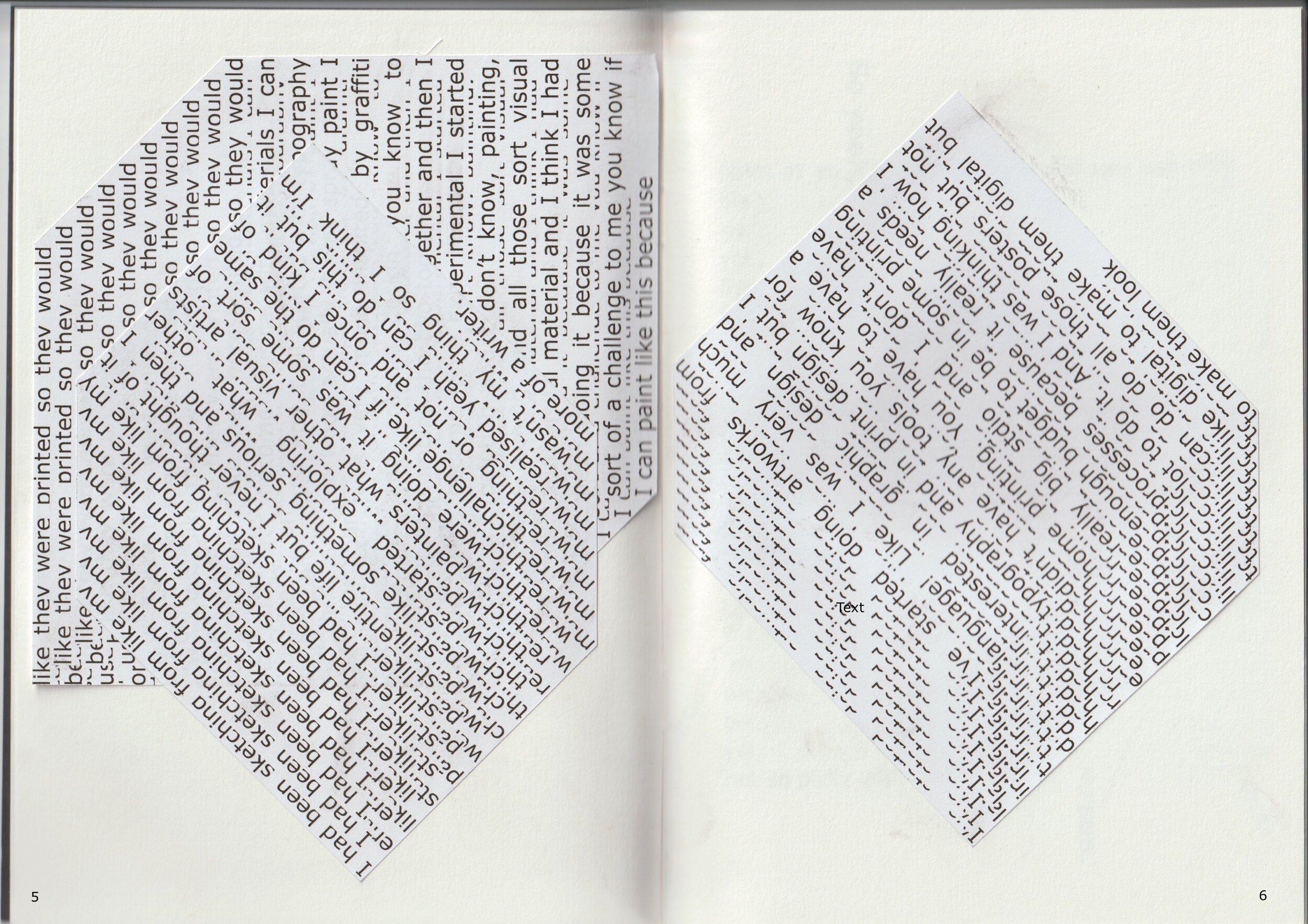
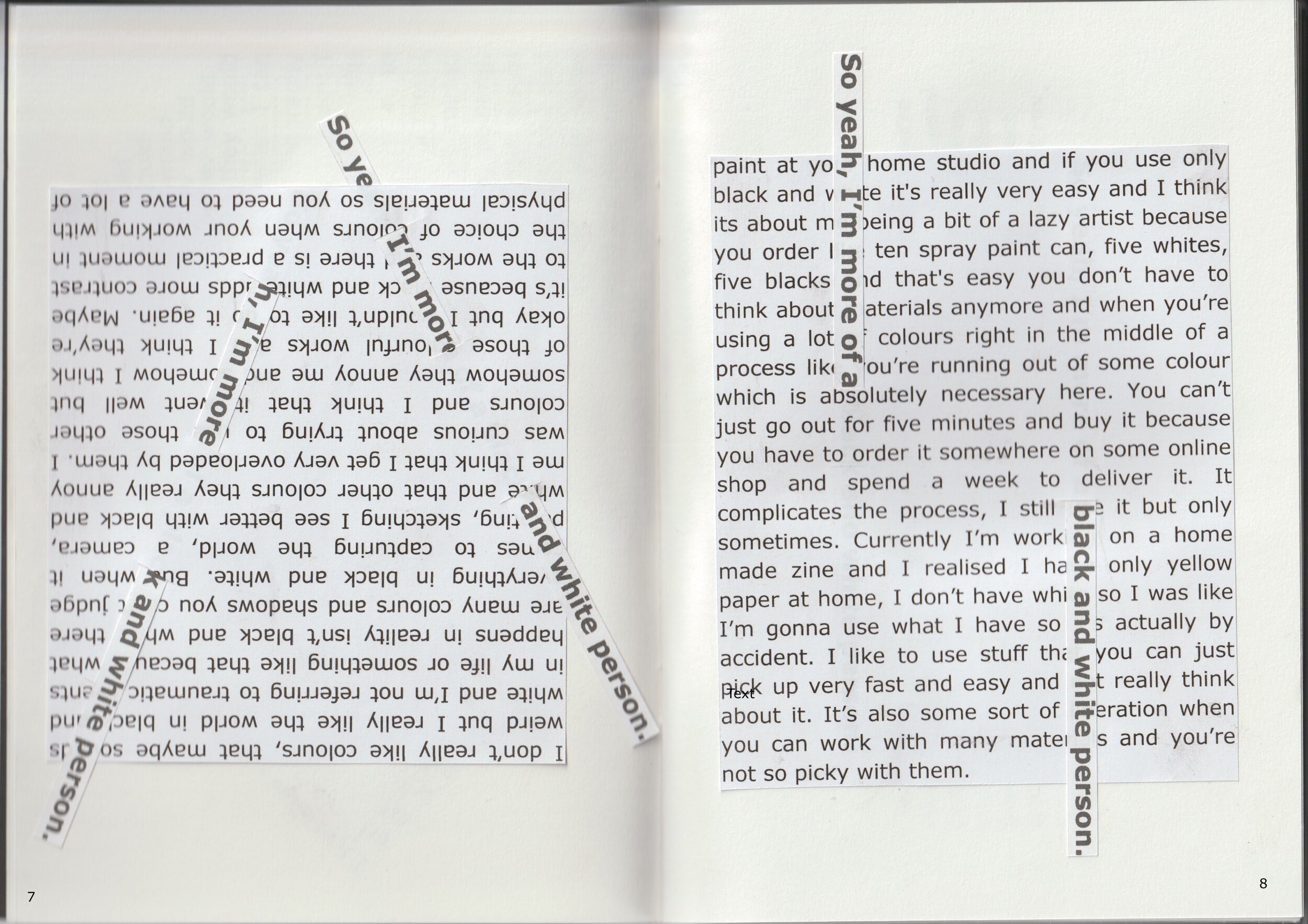
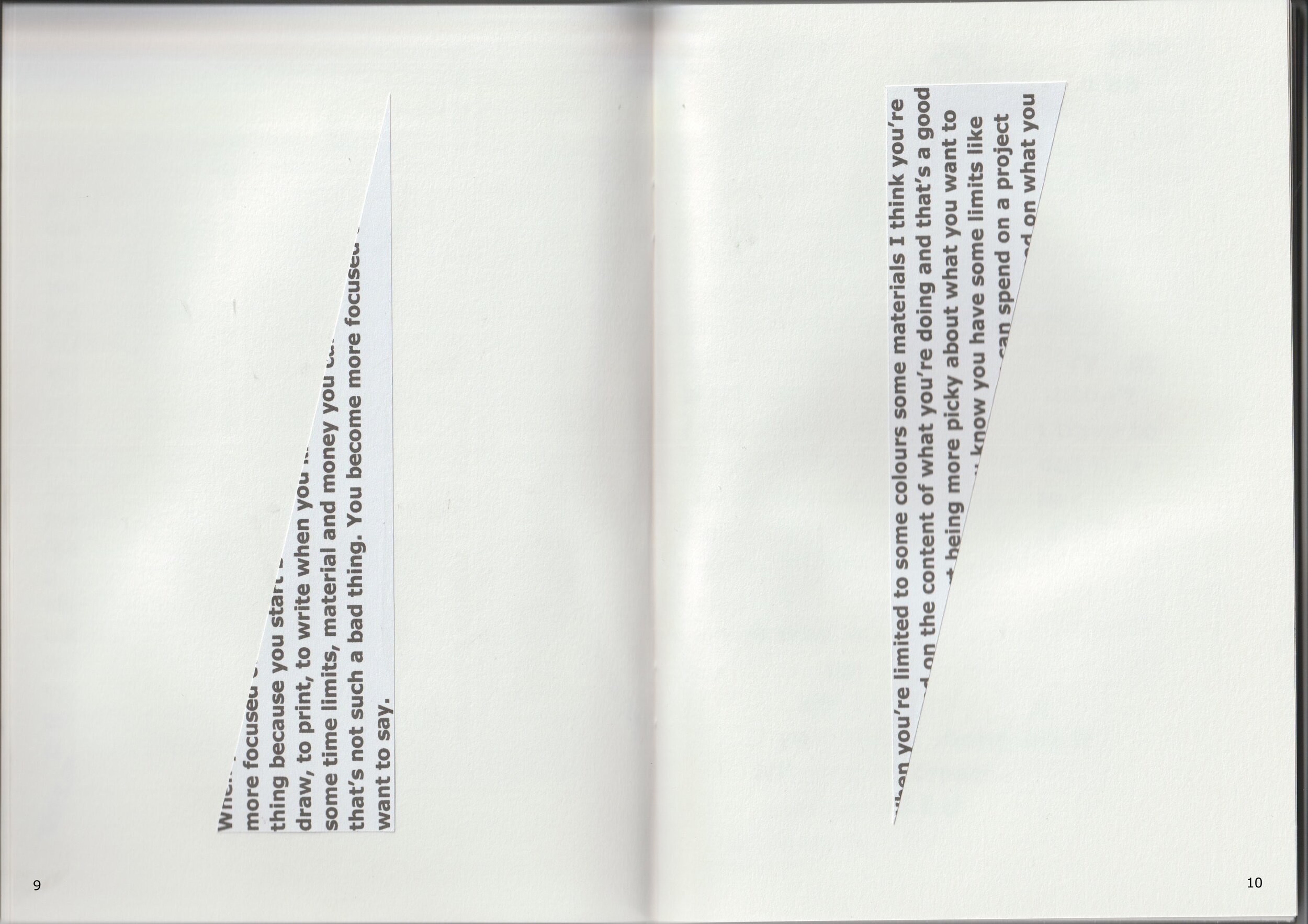
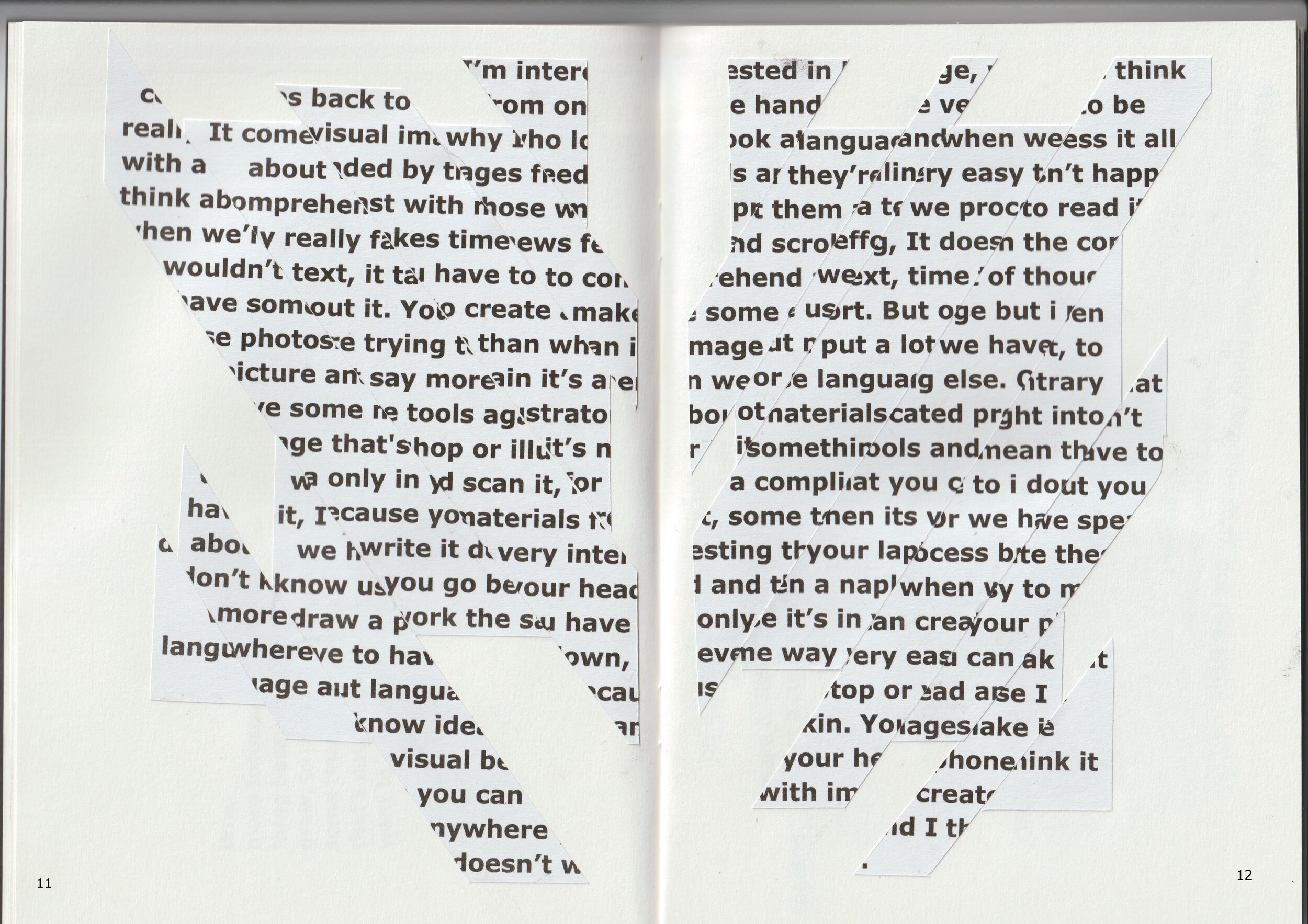
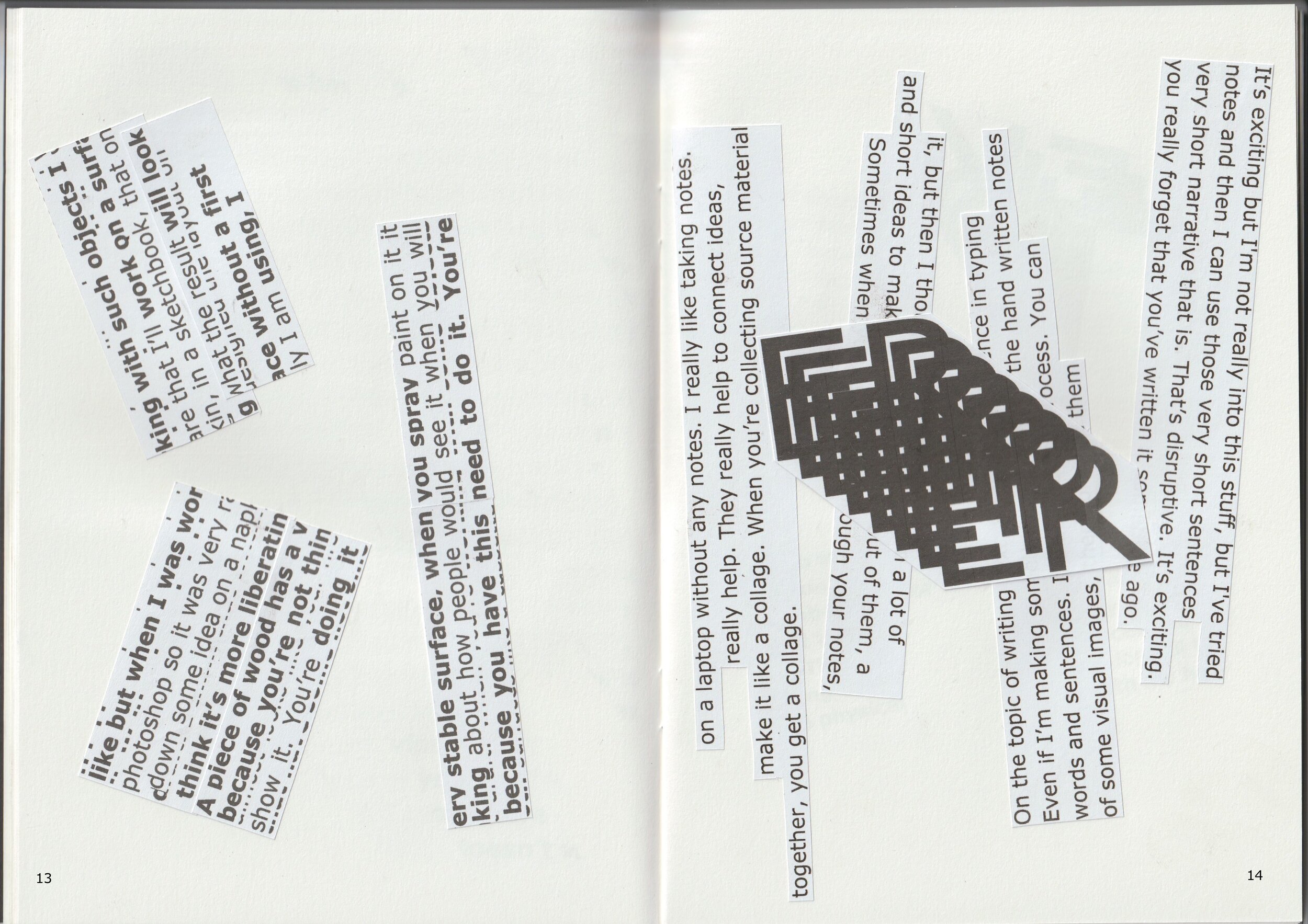
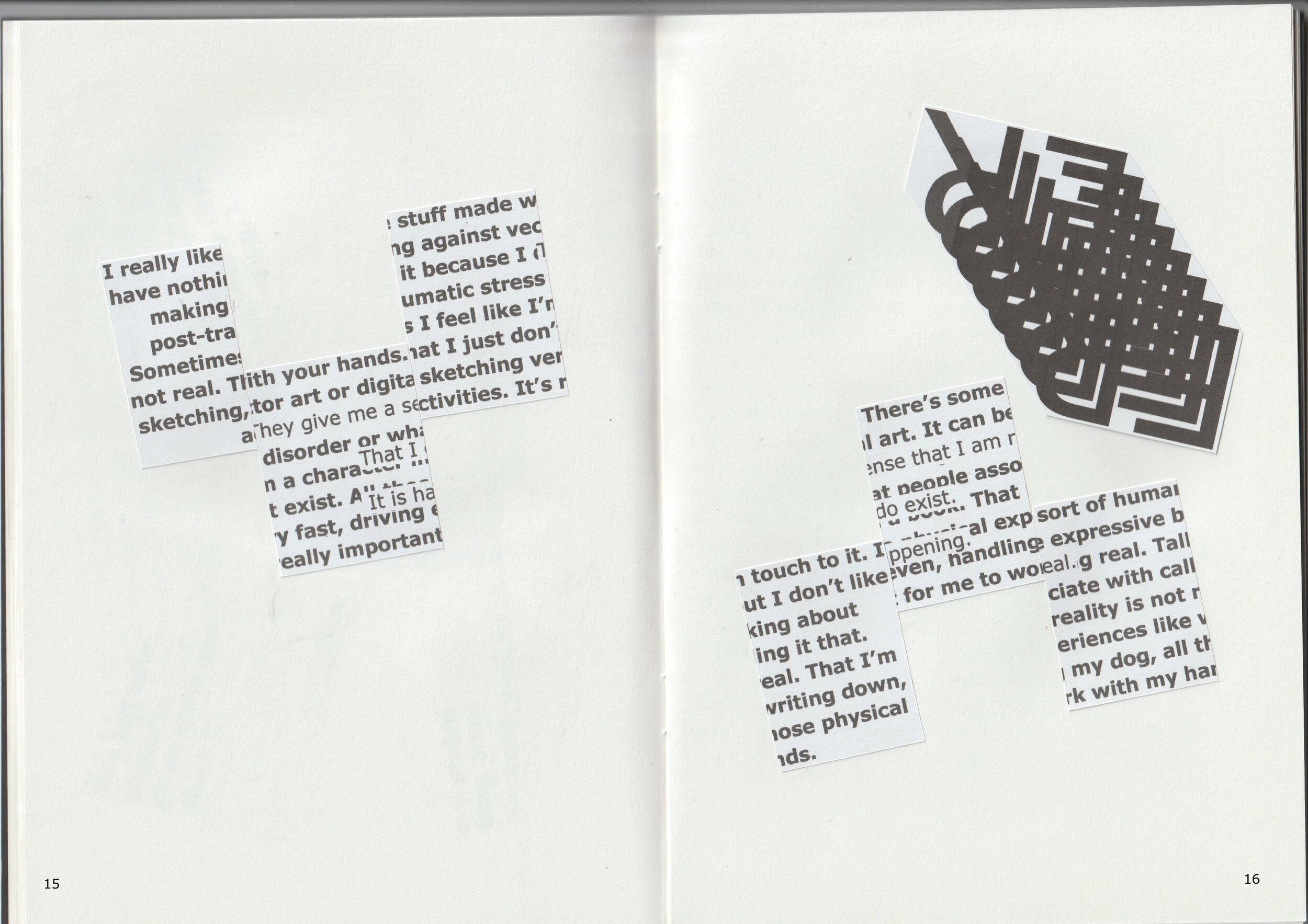
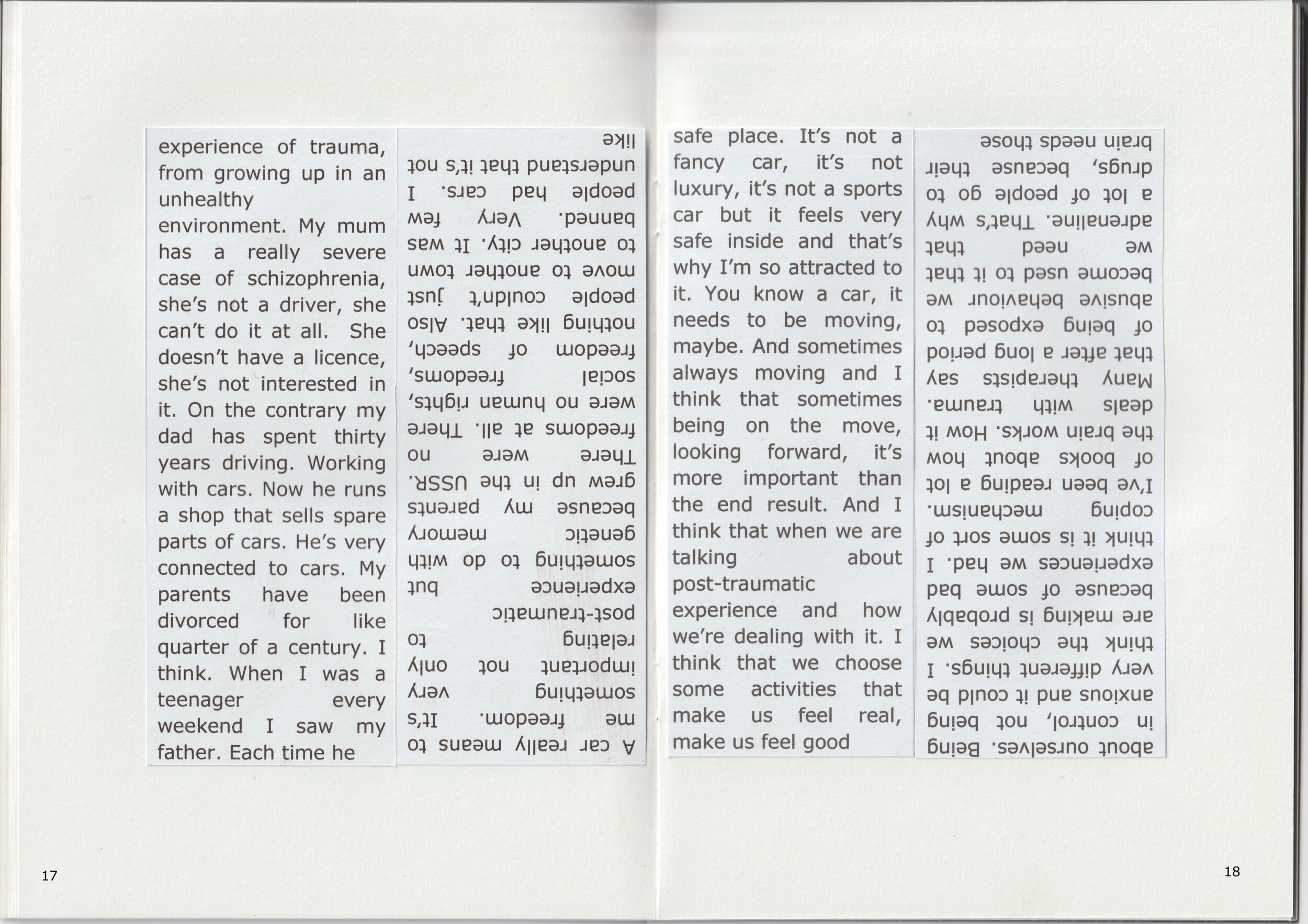
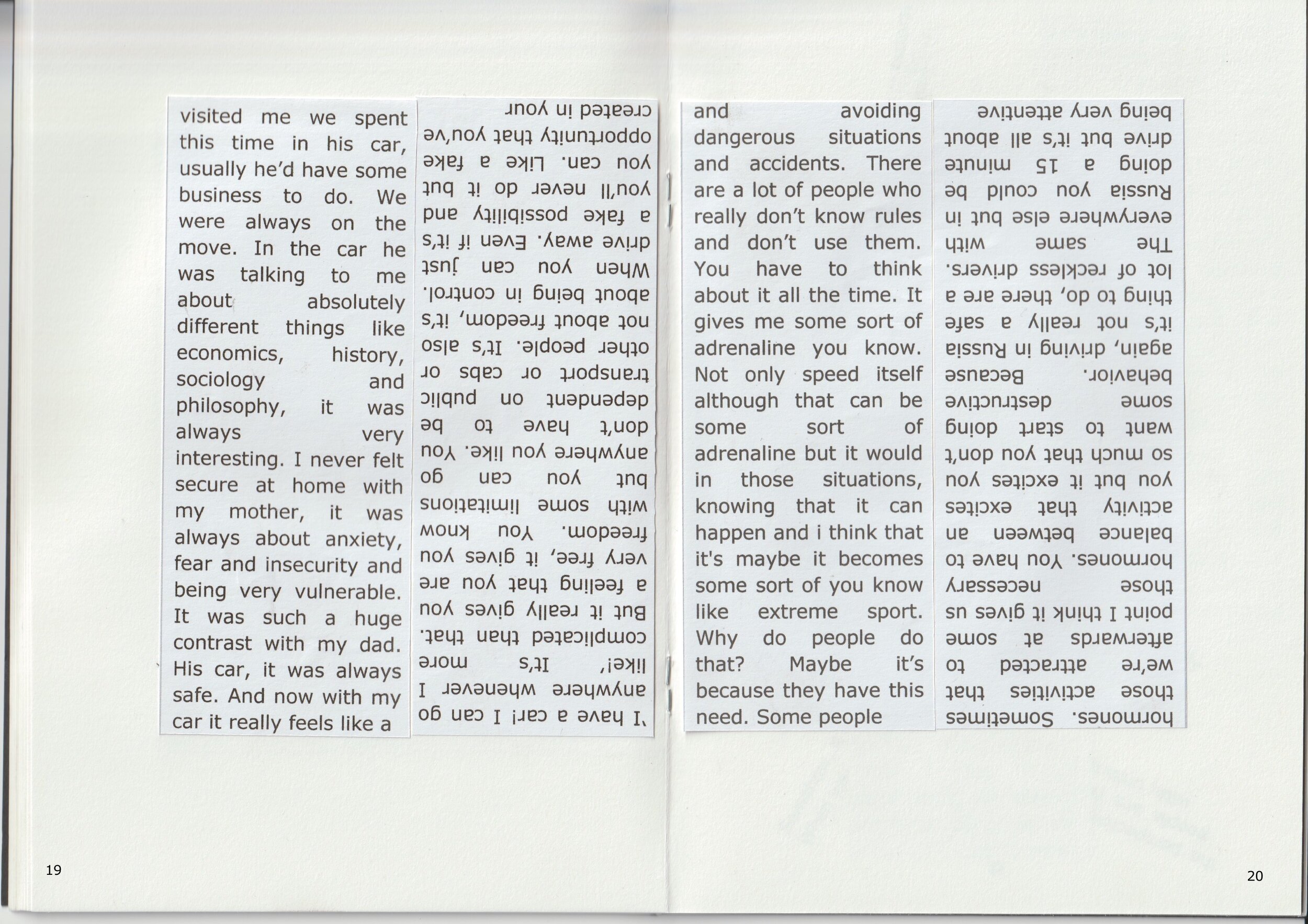
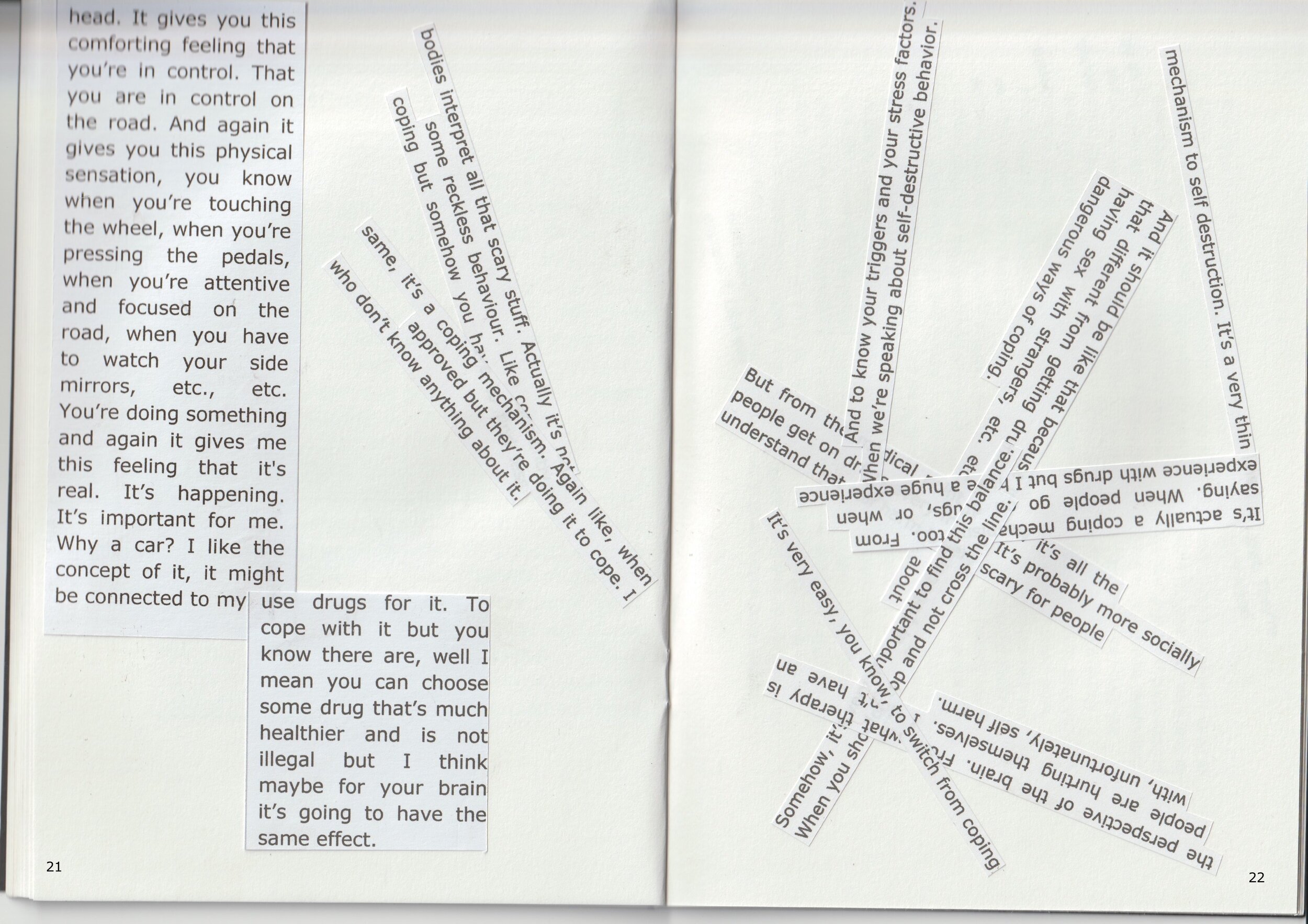
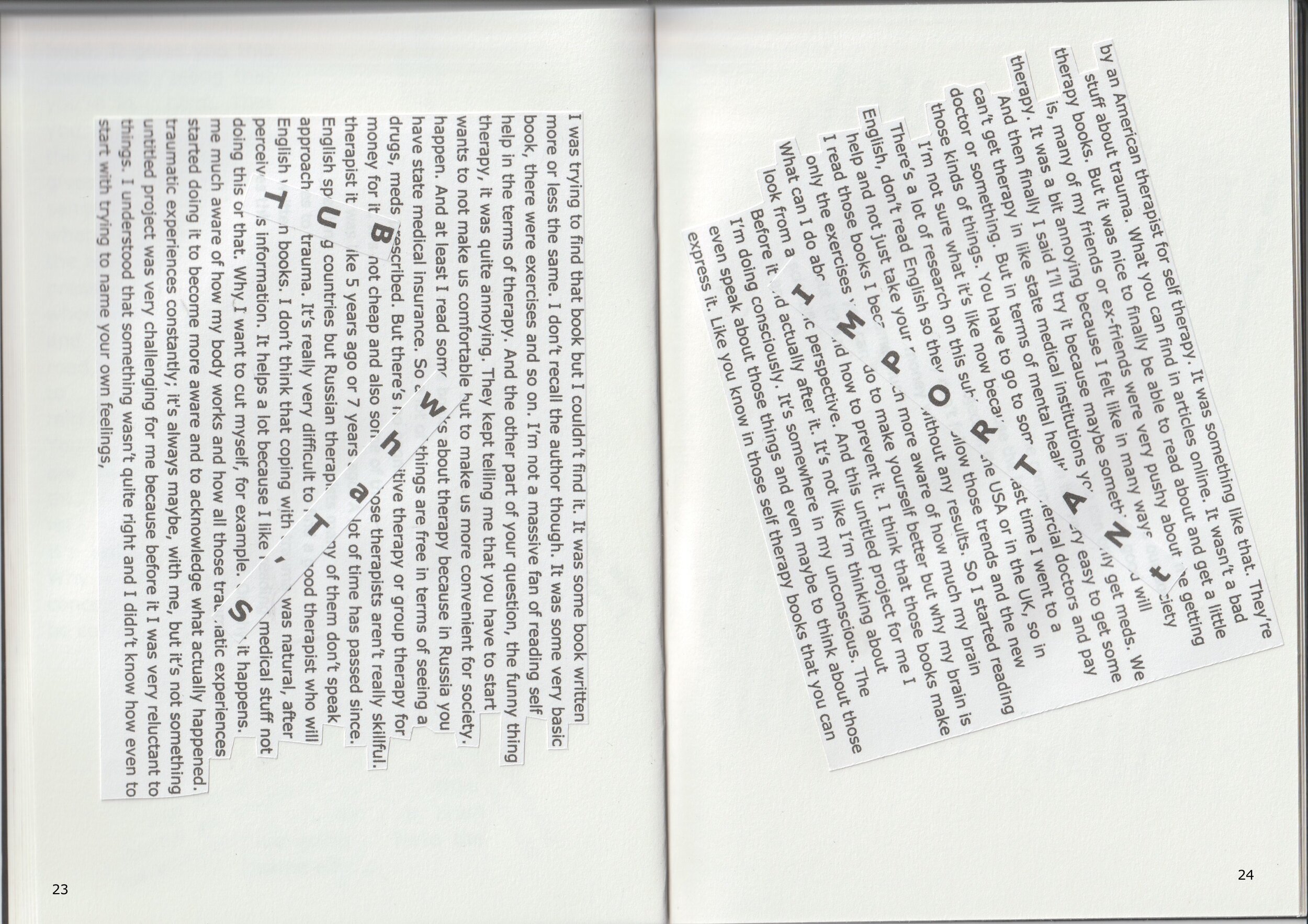
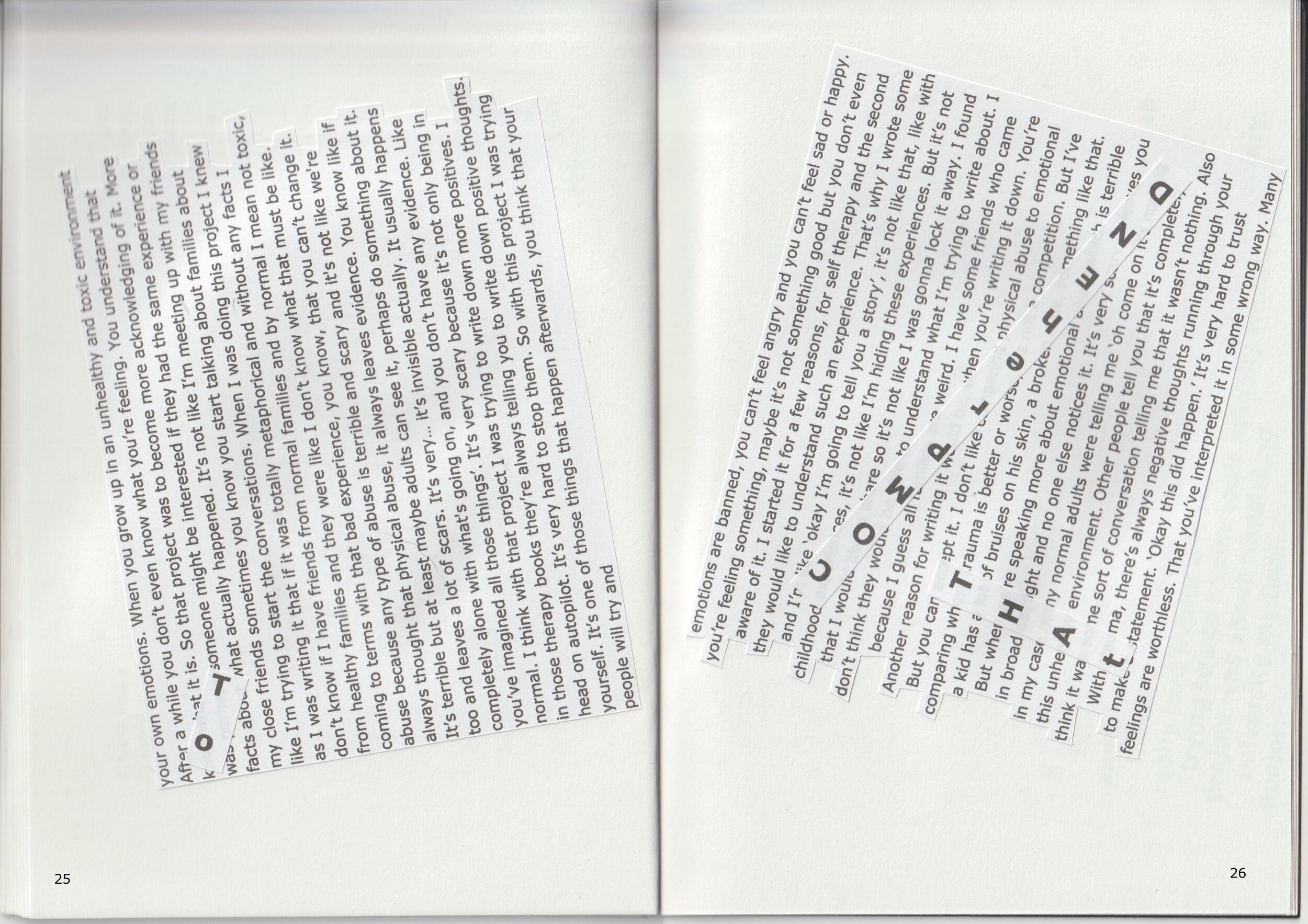
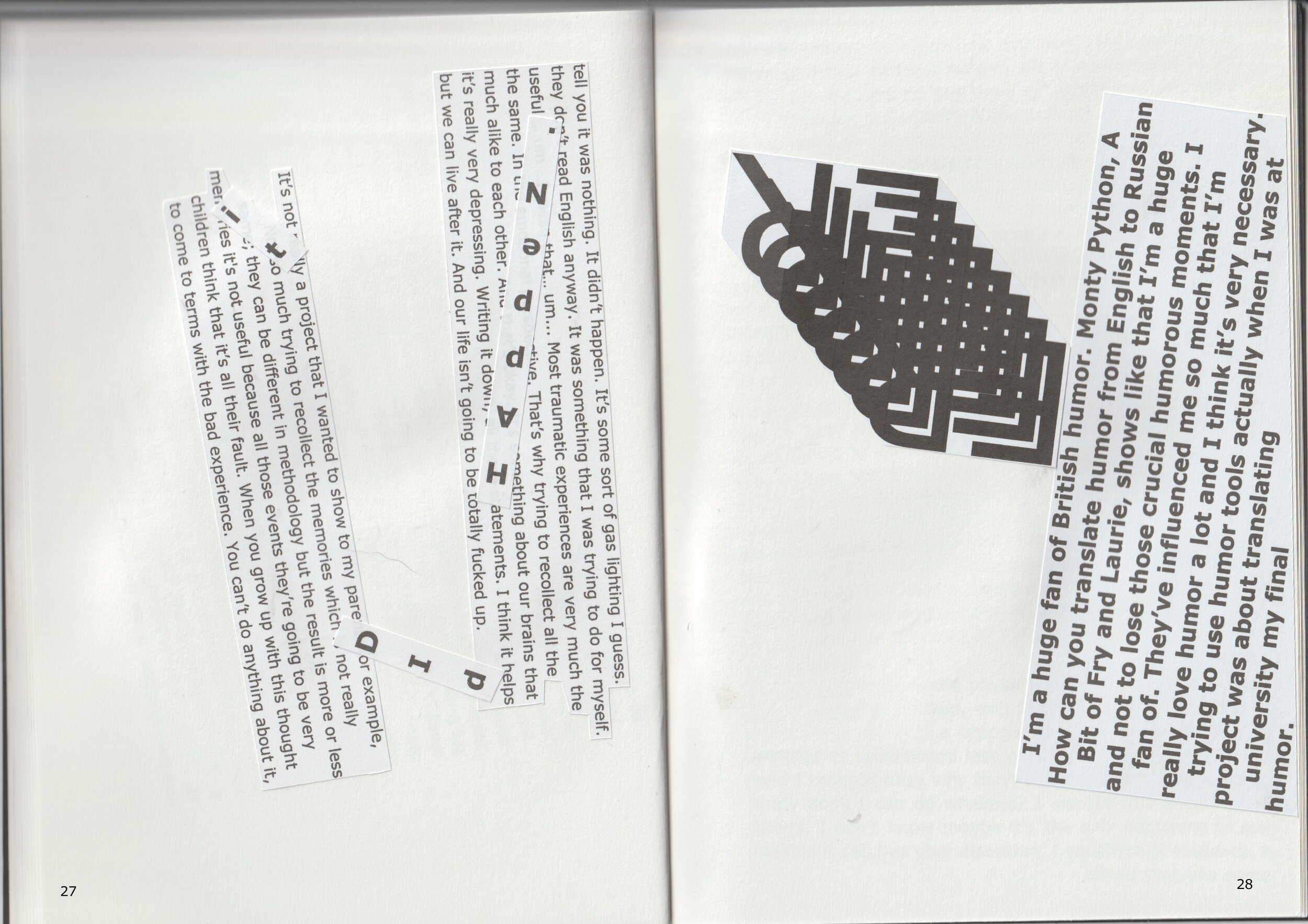
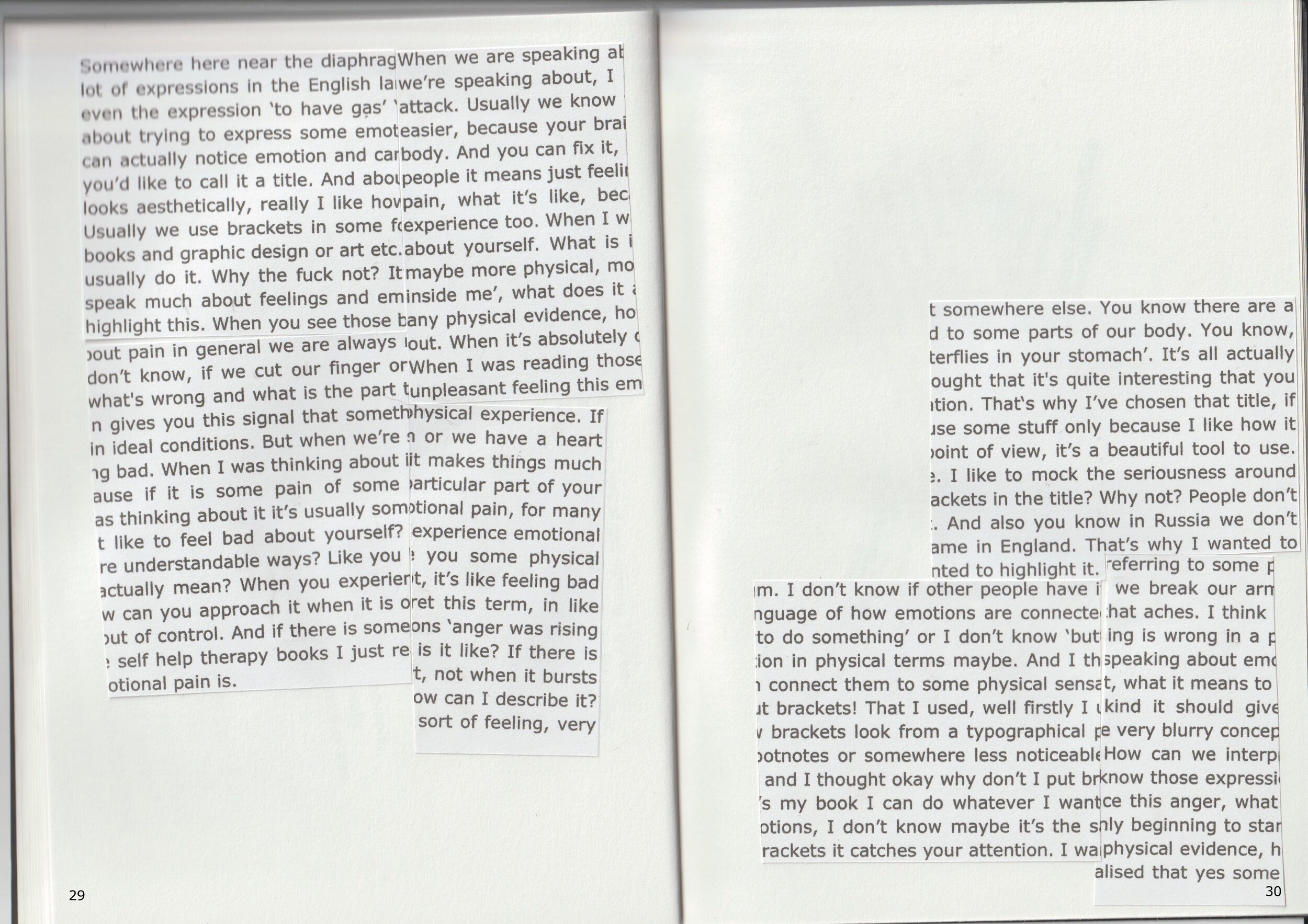
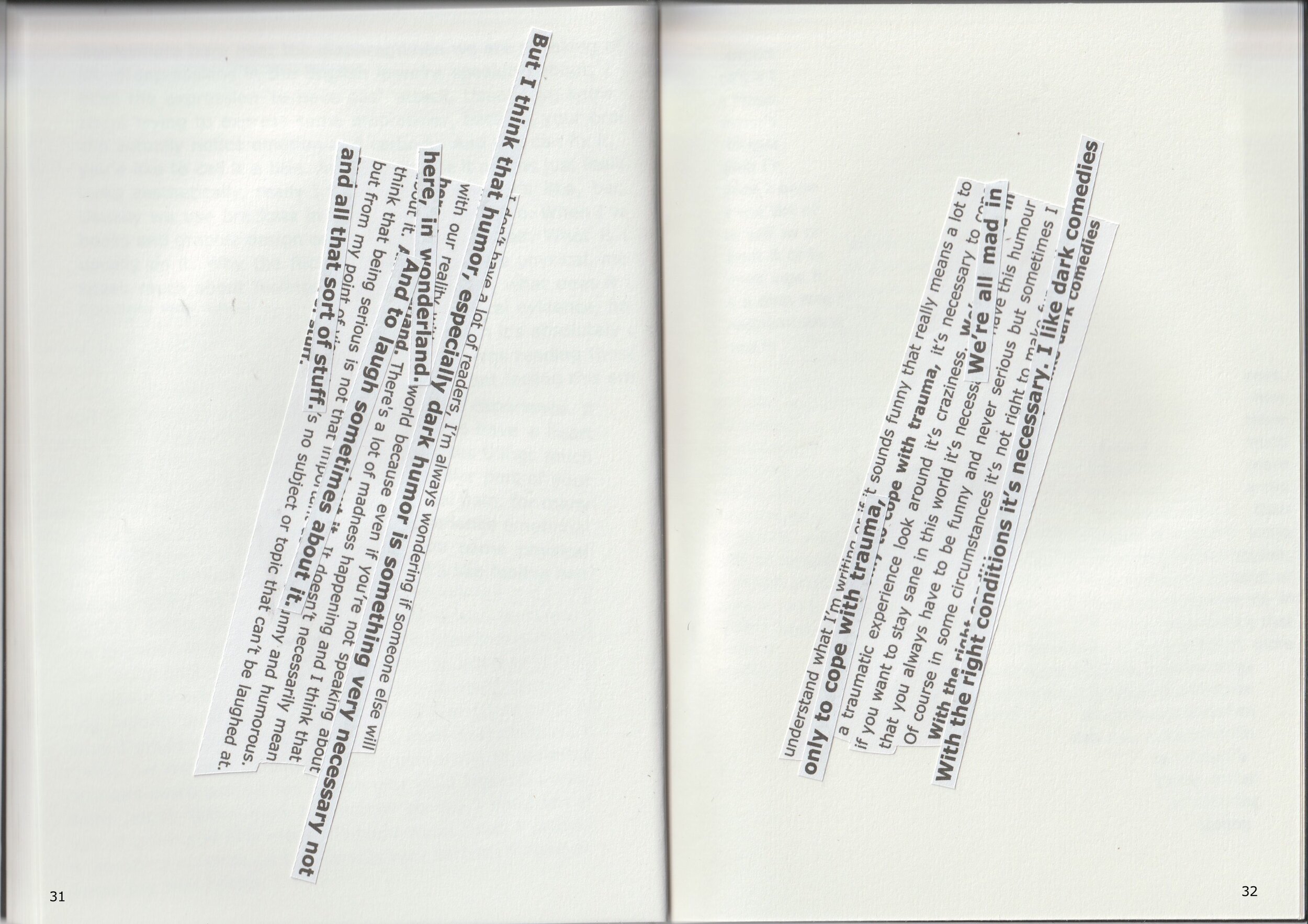
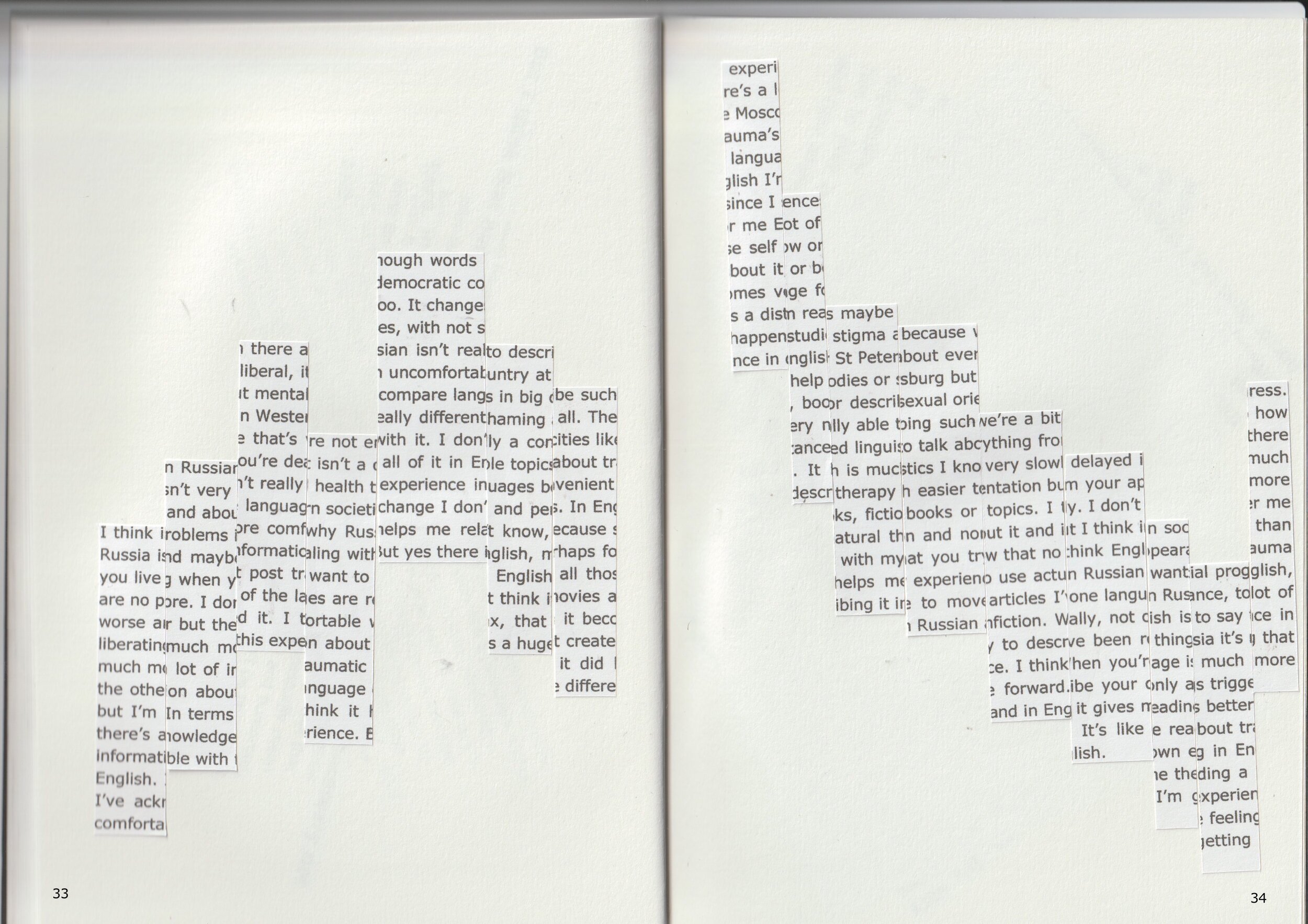
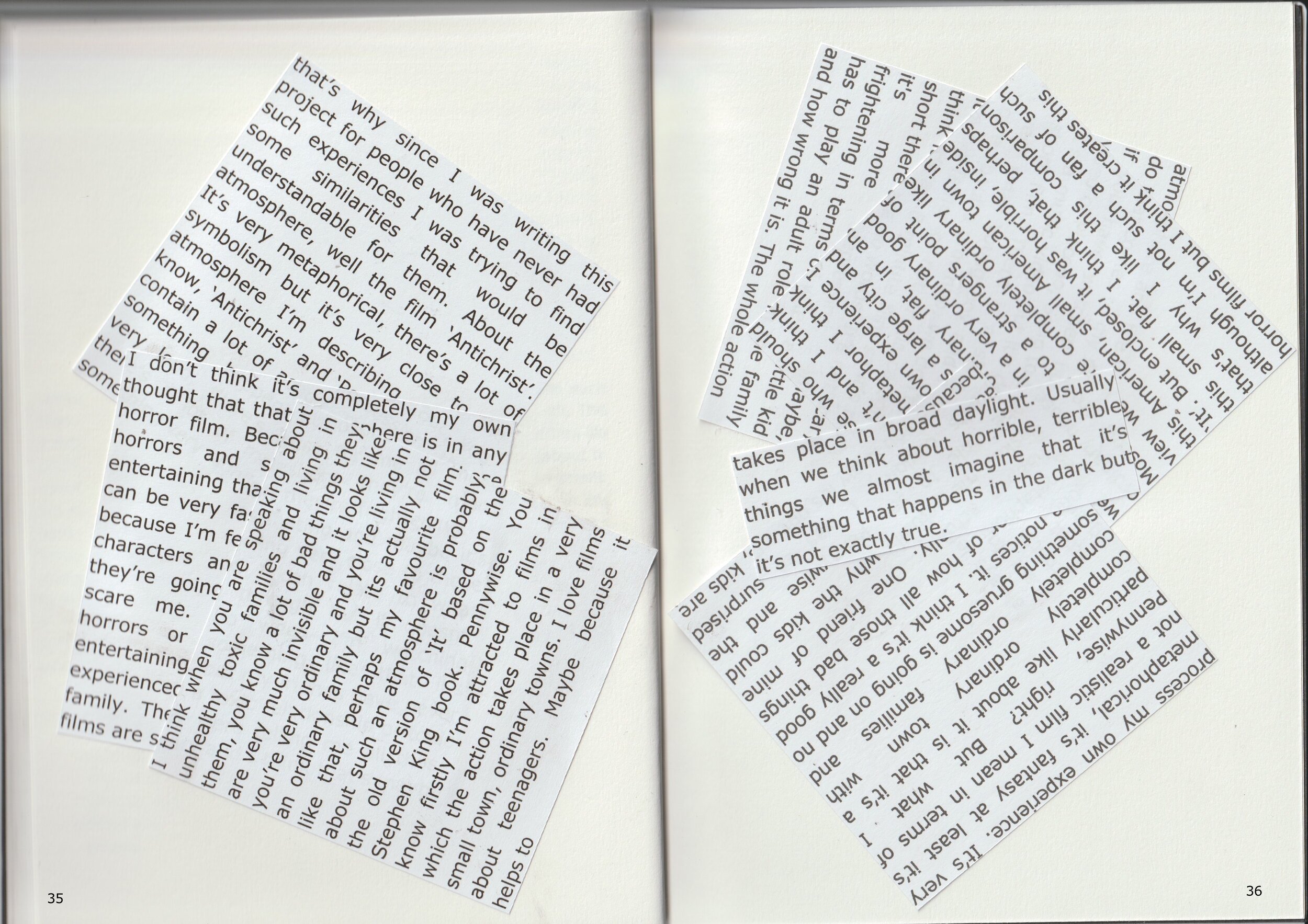
(Cont.) So a lot of things are free in terms of seeing a doctor or something. But in terms of mental health it’s very easy to get some drugs, meds prescribed. But there’s no cognitive therapy or group therapy for those kinds of things. You have to go to some commercial doctors and pay money for it. It’s not cheap and also some of those therapists aren’t really skilful. I’m not sure what it’s like now because the last time I went to a therapist it was like 5 years ago or 7 years ago. A lot of time has passed since. There’s a lot of research on this subject in the USA or in the UK, so in English speaking countries but Russian therapists many of them don’t speak English, don’t read English so they don’t follow those trends and the new approaches to trauma. It’s really very difficult to find a good therapist who will help and not just take your money without any results. So I started reading English written books. I don’t think that coping with trauma was natural, after I read those books I became much more aware of how much my brain perceives this information. It helps a lot because I like reading medical stuff not only the exercises you can do to make yourself better but why my brain is doing this or that. Why I want to cut myself, for example. Or why it happens. What can I do about it? And how to prevent it. I think that those books make me much more aware of how my body works and how all those traumatic experiences look from a scientific perspective. And this untitled project for me, I started doing it to become more aware and to acknowledge what actually happened. Before it and actually after it. It’s not like I’m thinking about traumatic experiences constantly; it's always maybe, with me, but it’s not something I’m doing consciously. It’s somewhere in my unconscious. The untitled project was very challenging for me because before it I was very reluctant to even speak about those things and even maybe to think about those things. I understood that something wasn’t quite right and I didn’t know how even to express it. Like you know in those self therapy books that you can start with trying to name your own feelings, your own emotions. When you grow up in an unhealthy and toxic environment emotions are banned, you can’t feel angry and you can’t feel sad or happy. After a while you don’t even know what you’re feeling. You understand that you’re feeling something, maybe it’s not something good but you don’t even know what it is. So that project was to become more acknowledging of it. More aware of it. I started it for a few reasons, for self therapy and the second was perhaps someone might be interested if they had the same experience or they would like to understand such an experience. That’s why I wrote some facts about what actually happened. It’s not like I’m meeting up with my friends and I’m like ‘okay I’m going to tell you a story’, it’s not like that, like with my close friends sometimes you know you start talking about families, about childhood experiences, it’s not like I’m hiding these experiences. But it’s not like I’m trying to start the conversations. When I was doing this project I knew that I would like to share so it’s not like I was going lock it away. I found as I was writing it that if it was totally metaphorical and without any facts I don’t think they would be able to understand what I’m trying to write about. I don’t know if I have friends from normal families and by normal I mean not toxic, because I guess all families are weird. I have some friends who came from healthy families and they were like I don’t know what that must be like. Another reason for writing it would be, when you’re writing it down. You’re coming to terms with that bad experience, you know, that you can’t change it. But you can accept it. I don’t like comparing physical abuse to emotional abuse because any type of abuse is terrible and scary and it's not like we're comparing whose trauma is better or worse, it’s not a competition. But I’ve always thought that physical abuse, it always leaves evidence. You know like if a kid has a lot of bruises on his skin, a broken nose, something like that. It’s terrible but at least maybe adults can see it, perhaps do something about it. But when we’re speaking more about emotional abuse which is terrible too and leaves a lot of scars. It’s very… it’s invisible actually. It usually happens in broad daylight and no one else notices it. It’s very scary, it leaves you completely alone with what's going on, and you don’t have any evidence. Like in my case many normal adults were telling me ‘oh come on it’s nothing you’ve imagined all those things’. It’s very scary because it’s not only being in this unhealthy environment. Other people tell you that it’s completely normal. I think with that project I was trying to write down more positives. I think it was some sort of conversation telling me that it wasn’t nothing. Also in those therapy books they’re always telling you to write down positive thoughts. With trauma, there’s always negative thoughts running through your head on autopilot. It’s very hard to stop them. So with this project I was trying to make a statement. ‘Okay this did happen.’ It’s very hard to trust yourself. It’s one of those things that happen afterwards, you think that your feelings are worthless. That you’ve interpreted it in some wrong way. Many people will try and tell you it was nothing. It didn’t happen. It’s some sort of gas lighting I guess. It’s not really a project that I wanted to show to my parents for example, they don’t read English anyway. It was something that I was trying to do for myself. Not so much trying to recollect the memories which is not really useful … um …I mean that… um... Most traumatic experiences are very much the same; they can be different in methodology but the result is more or less the same. In the emotional perspective. That’s why trying to recollect all the memories it's not useful because all those events they’re going to be very much alike to each other. But what’s important to comprehend that it did happen. And that’s okay. It's something about our brains that children think that it’s all their fault. When you grow up with this thought it’s really very depressing. Writing it down, all those statements. I think it helps to come to terms with the bad experience. You can’t do anything about it, but we can live after it. And our life isn’t going to be totally fucked up.
28
I’m a huge fan of British humour. Monty Python, A Bit of Fry and Laurie, shows like that I’m a huge fan of. They’ve influenced me so much that I’m trying to use humour tools actually when I was at university my final project was about translating humour. How can you translate humour from English to Russian and not to lose those crucial humorous moments. I really love humour a lot and I think it’s very necessary.
29-30
When we are speaking about pain in general we are always referring to some physical experience. If we’re speaking about, I don’t know, if we cut our finger or we break our arm or we have a heart attack. Usually we know what's wrong and what is the part that aches. I think it makes things much easier, because your brain gives you this signal that something is wrong in a particular part of your body. And you can fix it, in ideal conditions. But when we’re speaking about emotional pain, for many people it means just feeling bad. When I was thinking about it, what it means to experience emotional pain, what it’s like, because if it is some pain of some kind it should give you some physical experience too. When I was thinking about it it’s usually some very blurry concept, it’s like feeling bad about yourself. What is it like to feel bad about yourself? How can we interpret this term, in like maybe more physical, more understandable ways? Like you know those expressions ‘anger was rising inside me’, what does it actually mean? When you experience this anger, what is it like? If there is any physical evidence, how can you approach it when it is only beginning to start, not when it bursts out. When it’s absolutely out of control. And if there is some physical evidence, how can I describe it? When I was reading those self help therapy books I just realised that yes some sort of feeling, very unpleasant feeling this emotional pain is. Somewhere here near the diaphragm. I don’t know if other people have it somewhere else. You know there are a lot of expressions in the English language of how emotions are connected to some parts of our body. You know, even the expression ‘to have gas’ ‘to do something’ or I don’t know ‘butterflies in your stomach’. It’s all actually about trying to express some emotion in physical terms maybe. And I thought that it's quite interesting that you can actually notice emotion and can connect them to some physical sensation. ‘[emotional] pain is somewhere near the diaphragm.’ That‘s why I’ve chosen that title, if you’d like to call it a title. And about brackets! That I used, well firstly I use some stuff only because I like how it looks aesthetically, really I like how brackets look from a typographical point of view, it’s a beautiful tool to use. Usually we use brackets in some footnotes or somewhere less noticeable. I like to mock the seriousness around books and graphic design or art etc., and I thought okay why don’t I put brackets in the title? Why not? People don’t usually do it. Why the fuck not? It’s my book I can do whatever I want. And also you know in Russia we don’t speak much about feelings and emotions, I don’t know maybe it’s the same in England. That’s why I wanted to highlight this. When you see those brackets it catches your attention. I wanted to highlight it.
31-32
I don’t have a lot of readers, I’m always wondering if someone else will understand what I’m writing or if it sounds funny that really means a lot to me. But I think that humor, especially dark humor is something very necessary not only to cope with trauma, it’s necessary to cope with our reality with our world because even if you’re not speaking about a traumatic experience look around it’s craziness. We’re all mad in here, in wonderland. There's a lot of madness happening and I think that if you want to stay sane in this world it’s necessary to have this humour about it. And to laugh sometimes about it. It doesn’t necessarily mean that you always have to be funny and never serious but sometimes I think that being serious is not that important as being funny and humorous. Of course in some circumstances it’s not right to make fun of things but from my point of view there’s no subject or topic that can’t be laughed at. With the right conditions it’s necessary. I like dark comedies and all that sort of stuff.
33-34
I think in Russian there are not enough words to describe such experiences maybe because we’re a bit delayed in social progress. Russia isn’t very liberal, it isn’t a democratic country at all. There’s a lot of stigma about everything from your appearance, to how you live and about mental health too. It changes in big cities like Moscow or St Petersburg but very slowly. I don’t want to say there are no problems in Western societies, with not shaming about trauma’s or bodies or sexual orientation but I think in Russia it’s much worse and maybe that’s why Russian isn’t really a convenient language for describing such topics. I think English is much more liberating when you’re dealing with uncomfortable topics. In English I’m really able to talk about it and in Russian things trigger me much more. I don’t really want to compare languages because since I studied linguistics I know that no one language is better than the other but the languages are really different and perhaps for me English is much easier to use actually, not only about trauma but I’m much more comfortable with it. I don’t know, all those self help therapy books or articles I’ve been reading in English, there’s a lot of information about all of it in English, movies about it, books, fiction and nonfiction. When you’re reading a lot of information about post traumatic experience in English it becomes very natural that you try to describe your own experience in English. In terms of the language change I don’t think it creates a distance with my experience. I think it gives me the feeling that I’ve acknowledged it. I think it helps me relax, that it did happen. It helps me to move forward. It’s like I’m getting more comfortable with this experience. But yes there is a huge difference in describing it in Russian and in English.
35-36
I don’t think it’s completely my own thought that that atmosphere is in any horror film. Because for me all those horrors and slashers they’re more entertaining than they’re frightening. It can be very fascinating and maybe it’s because I’m feeling very close to those characters and I can relate to what they’re going through but it doesn’t scare me. So when I’m watching horrors or something like that it’s entertaining, but my friends have never experienced a toxic relationship or toxic family. They were telling me all those films are scary and I think that’s maybe that’s why since I was writing this project for people who have never had such experiences I was trying to find some similarities that would be understandable for them. About the atmosphere, well the film ‘Antichrist’. It’s very metaphorical, there’s a lot of symbolism but it’s very close to the atmosphere I’m describing. But you know, ‘Antichrist’ and ‘Possession’, they contain a lot of action. There's always something happening there. They’re very loud, there’s a lot of shouting there’s a lot of moving around, it’s something very highlighting there, but I think when you are speaking about unhealthy toxic families and living in them, you know a lot of bad things they are very much invisible and it looks like you’re very ordinary and you’re living in an ordinary family but its actually not like that, perhaps my favourite film about such an atmosphere is probably the old version of ‘It’ based on the Stephen King book. Pennywise. You know firstly I’m attracted to films in which the action takes place in a very small town, ordinary towns. I love films about teenagers. Maybe because it helps to process my own experience. It’s very metaphorical, it’s fantasy at least it’s not a realistic film I mean in terms of Pennywise, right? But what I particularly like about it is that it’s a completely ordinary town with completely ordinary families and something gruesome is going on and no one notices it. I think it’s a really good metaphor of how all those bad things happen actually. One friend of mine asked me actually why the kids could be able to see Pennywise and the adults couldn’t, I was so surprised because you know it’s obvious, kids are always left alone by those who should care for them but don’t and I think that’s a really good metaphor I think that it resembles my own experience I grew up in Moscow it’s a large city and we lived in an ordinary flat, in an ordinary house, in a very ordinary good Moscow area, to a strangers point of view we were completely ordinary like this American, small American town in ‘It’. But enclosed, it was horrible, inside this small flat. I think that, perhaps that's why I like this comparison although I’m not such a fan of such horror films but I think it creates this atmosphere and the second actually we do that comes to my mind I don’t know if you have watched but it’s a music video of Placebo, ‘Song to Say Goodbye’, it's a music video but it’s done in like a short film. There is a story line of a very small young boy and who has to care about a grownup, we don’t know if it’s his father or not or his caregiver, I think it’s an 8 minute film so it’s really short there are no words. It’s not scary, it's more depressing, maybe, frightening in terms of when a little kid has to play an adult role in the family and how wrong it is. The whole action takes place in broad daylight. Usually when we think about horrible, terrible things we almost imagine that it’s something that happens in the dark but it’s not exactly true.
1-2
I think that nowadays I’m more like a writer now than a painter or a visual artist and this is the direction I’m trying to move to.
3-4
It’s not that I want to completely go away from visual practices because I like when language becomes something that you can maybe even touch like all the zines, self made magazines, some self made prints maybe something physical, when language becomes something physical but I think that I am really finished with my series of paintings and don’t want to continue doing it.
5-6
I’ve started doing artworks from language! Like I was very much interested in graphic design and typography and in print design but I didn’t have any tools you know for home printing. You have to have a really big studio and I don't have enough budget to be in some printing processes because it really means a lot to do it. And I was thinking how I can do do all those posters but not like digital but to make them look like they were printed so they would become physical, with materials I can use and it all started with typography on wood actually it was spray paint I was very much inspired by graffiti and graphic design you know to combine the two together and then I became more experimental I started painting and I don’t know, painting, sketching and all those sort visual stuff, visual material and I think I had been doing it because it was some sort of a challenge to me you know if I can paint like this because I had been sketching from like my entire life but I never thought of it like something serious and then I started exploring what other painters what other visual artists were doing. It was some sort of challenge like if I can do the same thing or not and once I kind of realised yeah I can do this but it wasn’t my thing so I think I’m more of a writer.
7-8
I don’t really like colours, that maybe sounds weird but I really like the world in black and white and I’m not referring to traumatic events in my life or something like that because what happens in reality isn’t black and white there are many colours and shadows you can’t judge everything in black and white. But when it comes to capturing the world, a camera, painting, sketching I see better with black and white and other colours they really annoy me I think that I get very overloaded by them. I was curious about trying to use those other colours and I think that it went well but somehow they annoy me and somehow I think of those colourful works and I think they’re okay but I wouldn’t like to do it again. Maybe it’s because black and white adds more contrast to the works and there is a practical moment in the choice of colours when your working with physical materials, so you need to have a lot of paint at your home studio and if you use only black and white it's really very easy and I think its about me being a bit of a lazy artist because you order like ten spray paint cans, five whites, five blacks and that's easy you don’t have to think about materials anymore and when you’re using a lot of colours right in the middle of a process like you’re running out of some colour which is absolutely necessary here. You can’t just go out for five minutes and buy it because you have to order it somewhere on some online shop and spend a week to deliver it. It complicates the process, I still use it but only sometimes. Currently I’m working on a home made zine and I realised I have only yellow paper at home, I don’t have white so I was like I’m gonna use what I have so it's actually by accident. I like to use stuff that you can just pick up very fast and easy and not really think about it. It’s also some sort of liberation when you can work with many materials and you’re not so picky with them. So yeah, I’m more of a black and white person.
9-10
When you’re limited to some colours some materials I think you’re more focused on the content of what you’re doing and that’s a good thing because you start being more picky about what you want to draw, to print, to write when you know you have some limits like some time limits, material and money you can spend on a project that’s not such a bad thing. You become more focused on what you want to say.
11-12
It comes back to why I’m interested in language, when we think about visual images from one hand they’re very easy to be comprehended by those who look at them and we process it all really really fast with news feeds and scrolling. It doesn’t happen with a text, it takes time to comprehend a text, time to read it, to think about it. You have to make some effort. But on the contrary when we’re trying to create an image we put a lot of thought into it, I wouldn’t say more than when we use language but I mean it’s about materials, we have to, I don’t know use photoshop or illustrator or something else. Or we have to draw a picture and scan it, it’s not a complicated process but you have to have some materials for it, some tools and when we speak about language, it's very interesting that you can create these, I don’t know ideas only in your head and then its very easy to make it more visual because you have only your laptop or your phone where you can write it down, even a napkin. You can create language anywhere you go because it’s in your head and I think it doesn’t work the same way with images.
13
A piece of wood has a very stable surface, when you spray paint on it it almost looks like your first draft. When you’re working with some objects that have some not smooth surfaces like a cassette tape you never know what the result will look like but when I was working with such objects I designed the layout on photoshop so it was very rare that I’ll work on a surface without a first draft. I think that writing down some idea on a napkin, in a sketchbook, that only I am using, I think it’s more liberating because you’re not thinking about how people would see it when you will show it. You’re doing it because you have this need to do it. You’re thinking about only what you’re writing down, not how people will interpret it. Writing in a sketchbook boosts my creativity.
14
On the topic of writing text, there is a difference in typing on a laptop without any notes. I really like taking notes. Even if I’m making something on a laptop the hand written notes really help. They really help to connect ideas, words and sentences. It’s an exciting process. You can make it like a collage. When you’re collecting source material of some visual images, then combine them together, you get a collage. It’s exciting but I'm not really into this stuff, but I've tried it, but then I thought I could write down a lot of notes and then I can use those very short sentences and short ideas to make some short texts out of them, a very short narrative that is. That’s disruptive. It’s exciting. Sometimes when you’re looking through your notes, you really forget that you’ve written it sometime ago.
15-16
I really like stuff made with your hands. There’s some sort of human touch to it. I have nothing against vector art or digital art. It can be expressive but I don’t like making it because I don’t feel like I’m doing something real. Talking about post-traumatic stress disorder or what people associate with calling it that. Sometimes I feel like I’m a character in a book. That reality is not real. That I’m not real. That I just don’t exist. All those physical experiences like writing down, sketching, sketching very fast, driving even, handling my dog, all those physical activities. They give me a sense that I am real. That I do exist. It is happening. It’s really important for me to work with my hands.
17-21
A car really means to me freedom. It’s something very important not only relating to post-traumatic experience but something to do with genetic memory because my parents grew up in the USSR. There were no freedoms at all. There were no human rights, social freedoms, freedom of speech, nothing like that. Also people couldn’t just move to another town to another city. It was banned. Very few people had cars. I understand that it’s not like ‘I have a car! I can go anywhere whenever I like!’ It’s more complicated than that. But it really gives you a feeling that you are very free, it gives you freedom. You know with some limitations but you can go anywhere you like. You don’t have to be dependent on public transport or cabs or other people. It’s also not about freedom, it’s about being in control. When you can just drive away. Even if it’s a fake possibility and you’ll never do it but you can. Like a fake opportunity that you’ve created in your head. It gives you this comforting feeling that you’re in control. That you are in control on the road. And again it gives you this physical sensation, you know when you’re touching the wheel, when you’re pressing the pedals, when you’re attentive and focused on the road, when you have to watch your side mirrors, etc., etc. You’re doing something and again it gives me this feeling that it's real. It’s happening. It’s important for me. Why a car? I like the concept of it, it might be connected to my experience of trauma, from growing up in an unhealthy environment. My mum has a really severe case of schizophrenia, she’s not a driver, she can’t do it at all. She doesn’t have a licence, she’s not interested in it. On the contrary my dad has spent thirty years driving. Working with cars. Now he runs a shop that sells spare parts of cars. He’s very connected to cars. My parents have been divorced for like quarter of a century. I think. When I was a teenager every weekend I saw my father. Each time he visited me we spent this time in his car, usually he’d have some business to do. We were always on the move. In the car he was talking to me about absolutely different things like economics, history, sociology and philosophy, it was always very interesting. I never felt secure at home with my mother, it was always about anxiety, fear and insecurity and being very vulnerable. It was such a huge contrast with my dad. His car, it was always safe. And now with my car it really feels like a safe place. It’s not a fancy car, it’s not luxury, it’s not a sports car but it feels very safe inside and that’s why I’m so attracted to it. You know a car, it needs to be moving, maybe. And sometimes always moving and I think that sometimes being on the move, looking forward, it’s more important than the end result. And I think that when we are talking about post-traumatic experience and how we’re dealing with it. I think that we choose some activities that make us feel real, make us feel good about ourselves. Being in control, not being anxious and it could be very different things. I think the choices we are making is probably because of some bad experiences we had. I think it is some sort of coping mechanism. I’ve been reading a lot of books about how the brain works. How it deals with trauma. Many therapists say that after a long period of being exposed to abusive behaviour we become used to it that we need that adrenaline. That’s why a lot of people go to drugs, because their brain needs those hormones. Sometimes those activities that we’re attracted to afterwards at some point I think it gives us those necessary hormones. You have to balance between an activity that excites you but it excites you so much that you don’t want to start doing some destructive behavior. Because again, driving in Russia it’s not really a safe thing to do, there are a lot of reckless drivers. The same with everywhere else but in Russia you could be doing a 15 minute drive but it’s all about being very attentive and avoiding dangerous situations and accidents. There are a lot of people who really don’t know rules and don’t use them. You have to think about it all the time. It gives me some sort of adrenaline you know. Not only speed itself although that can be some sort of adrenaline but it would in those situations, knowing that it can happen and I think that maybe it becomes some sort of you know like extreme sport. Why do people do that? Maybe it’s because they have this need. Some people use drugs for it, to cope with it but you know there are, well I mean you can choose some drug that’s much healthier and is not illegal but I think maybe for your brain it’s going to have the same effect.
21-22
It’s very easy, you know, to switch from coping mechanism to self destruction. It’s a very thin line. Somehow, it’s very important to find this balance. And to know your triggers and your stress factors. When you should stop and not cross the line. When we’re speaking about self-destructive behaviour. It’s actually a coping mechanism too. From the perspective of the brain. From what therapy is saying. When people go on drugs, or when people are hurting themselves. I don’t have an experience with drugs but I have a huge experience with, unfortunately, self harm. But from the medical point of view it’s all the same, it’s a coping mechanism. Again like, when people get on drugs every friday. It’s probably more socially approved but they’re doing it to cope. I understand that self harm is a very scary for people who don’t know anything about it. And it should be like that because it’s how our bodies interpret all that scary stuff. Actually it’s not that different from getting drunk or getting engaged in some reckless behaviour. Like constantly having sex with strangers, etc., etc. It’s all about coping but somehow you have to find less dangerous ways of coping.
23-27
I was trying to find that book but I couldn’t find it. It was some book written by an American therapist for self therapy. It was something like that. They’re more or less the same. I don’t recall the author though. It was some very basic stuff about trauma. What you can find in articles online. It wasn’t a bad book, there were exercises and so on. I’m not a massive fan of reading self therapy books. But it was nice to finally be able to read about and get a little help in the terms of therapy. And the other part of your question, the funny thing is, many of my friends or ex-friends were very pushy about me getting therapy, it was quite annoying. They kept telling me that you have to start therapy. It was a bit annoying because I felt like in many ways our society wants to not make us comfortable but to make us more convenient for society. And then finally I said I’ll try it because maybe something good will happen. And at least I read some books about therapy because in Russia you can’t get therapy in like state medical institutions you can only get meds. We have state medical insurance. (Cont. next column…)
expireddog has been published in A5 Magazine, Average Art and Wotisart.
HAIR OF THE DOG: A TUN OF RICHARD ZEISS (216 IMP. GAL)
In this experimental essay, Richard Zeiss contemplates the order of things. Can life and nature be an arbitrary measurement, or can it be easily categorised as we do with the books we keep on our shelves? How do algorithms measure and categorise our queries? What’s the pattern in thinking?
And perhaps, could it be that any classification in the end just seems arbitrary in the grand scheme of things?
RICHARD ZEISS
Is it better to speak, die, or have a water meter?
A few Saturdays ago, I woke up feeling abundantly lazy, and I was not looking forward to my morning exercise routine at all. (I never am, but was particularly unenthusiastic that day.) In an effort to appease my conscience, I decided to consult the internet if I could legitimately spread my one-hour routine over the entire day, and whether that was perhaps not actually more beneficial (I knew it wasn’t).
So, I took my phone and ran a Google search. The idea was to run a query like “Is it better to exercise once or often per day”, and my hope was that the guy in the internet knew what I meant and would promptly get back to me, no questions asked. Instead, the predictive text stopped me in my tracks:
Is it better to speak or die, rent or buy, be single, have a water meter, or have two dogs? My imagination was captured by the seeming arbitrariness of the suggestions. Was it arbitrary, though? As in, would the vast majority of society regard this array of questions as suggested by the Google algorithm as arbitrary, and if so, why? A thought that at first glance seems trivial – “of course” – but that is so defiant to analysis that it has spawned literature like Michel Foucault’s The Order of Things, in which he pretty much talks about nothing else. What are the underlying patterns of thought, action, and material, if any? Finding the one common rationale that forms the function for the above-cited questions of the speak/die- rent/buy-variety seems futile at first. It is this intuitive notion of futility, this “WHY do we intuitively feel that this is a dead end” that has got numerous thinkers busy over the centuries.
The first time I was confronted with what seemed like the question for an underlying world formula of thought and material was when I was 17, and we were reading Goethe’s Faust in literature class. So fervently is the protagonist looking for “was die Welt im Innersten zusammenhält” (“that of which the world consists in its core”) that he signs a pact with the Devil. Myself, during ten dubious years in the finance industry (and long before escaping into Art) , I was looking for underlying patterns in the financial markets (but with a significantly less noble motive), a quest later mirrored but much amplified in artistic prowess in the 1998 independent film Pi by Darren Aronofsky. In this movie (which was, incidentally, shot on 16mm black and white film), the protagonist, a mathematical genius, is obsessed with the idea that the Kabbalah holds the clue to the underlying pattern of the stock markets.
Back to Foucault’s “The Order of Things”. Ironically, my key takeaway was a short passage in the book’s preface, where Foucault quotes an essay by Jorge Luis Borges, though not by title. (N.B. The essay turns out to be “John Wilkins’ Analytical Language”. Welcome to the Rabbit Hole.) In that essay, Borges talks about one John Wilkins, who apparently in the 17th century tried to create an analytical language from scratch. Wilkins divided the universe into 40 categories, which were then subdivided into species. Every species was assigned a monosyllable of two letters, and more letters were added on to attain the desired level of specificity (e.g. “de” meant element; “deb” was the first of the elements, i.e. fire; “deba” was a portion of the fire, i.e. a flame; etc). Needless to say, that language never took off. The ambiguities much like the arbitrariness of some of the categories and sub-categories later led the German translator of Chinese novels, Dr. Franz Kuhn, to liken its structure to a certain Chinese encyclopaedia called “Heavenly Emporium of Benevolent Knowledge”, to my mind the beautiful gold standard of arbitrariness. In it, animals are classified thus:
Those that belong to the Emperor.
Embalmed ones.
Those that are trained.
Suckling pigs.
Mermaids.
Fabulous ones.
Stray dogs.
Those that are included in this classification.
Those that tremble as if they were mad.
Innumerable ones.
Those drawn with a very fine camel's hair brush.
Et cetera.
Those that have just broken the flower vase.
Those that, at a distance, resemble flies.
I got up and decided to run with these thoughts rather than to exercise. I had long been fascinated with the problem of library categories. “By subject” seemed to be the common denominator, the least arbitrary of all the possible arbitrary structures. I decided to rotate the matrix by 90 degrees, to invert the function, and to possibly introduce mermaids or suckling pigs into my bookshelf.
You may doubt the functionality of any of the alternative versions of my bookshelf. In other words, has the arbitrariness of structure dented the library’s librariness? To this I say: I have had two friends asking me whether I could come by and re-arrange theirs by colour, too. It would seem the question of categories is less trivial than it looks at first glance after all. (No takers for the “by exposure to society” one yet though.)
Richard Zeiss is from Vienna, Austria, and now lives in London. He holds an MA in Fine Art from CSM (London) and an MPhil in Painting from the RCA (London). His practice is also informed by his earlier (lacklustre) career in the finance industry and by an MSc in Finance (Vienna University) as well as by an MBA (IESE Barcelona). He has also shown his work internationally, among other places at solo shows with Georg Kargl Fine Arts (Vienna), Gallery Asbæk/AAC (Copenhagen), Da Wang Culture Highland (Shenzhen). He participated at the 2019 Lagos Biennial and has been featured at Frieze (London), ARCO (Madrid), and AKAA Fair (Paris).
Find more on Richard and his work here.
HAIR OF THE DOG: TWO JACKS OF MALIKA BOOKER (5.0 fl. oz)
In this interview, Malika Booker asserts that the eldest members of a family having experienced colonial trauma are the most resilient, which can manifest in silence on the matter of colonialism, and severity towards loved ones. This trauma is then passed down, like genes, to the next generation where children cannot ask their parents questions about colonial trauma for fear of it being met with adversity. It is then up to the grandchildren to then tell that story. Booker is one such grandchild dedicated to writing the stories of the Black Caribbean women in her family in poetry.
This interview is a film, which features mostly a blank screen. The viewer is advised to watch the entirety of the blank screen so as to not miss pertinent details that pertain to the interview’s subject matter and the interviewee, which appear randomly. Looking away from it in this case renders the viewer ignorant which is the problematic factor that is being discussed within Booker’s work and personal philosophy.
Unfortunately it has not been possible to provide captioning/subtitles this time around for this piece, but we will work to provide this in future.
Malika Booker is a British-Grenadian-Guyanese writer and multi-disciplinary artist. Booker is the author of Pepper Seed, which was shortlisted for the Seamus Heaney Centre Prize. She is currently a Douglas Caster Cultural Fellow at the University of Leeds, a Creative Writing Lecturer at Manchester Metropolitan University and a Slate Award recipient for research and development of a new play she is currently writing. Malika’s storytelling is focused on the anthropological research of the Black Caribbean experience, particularly in women, and communicating these narratives to a wider audience.
HAIR OF THE DOG: A PUNCHEON OF RACHELLE TOARMINO (72 imp. gal.)
Lydia Hounat interviews Peach Mag's Rachelle Toarmino on teaching, writing and the Internet.
(...) Writing has always felt like a natural outlet to me. I'm interested in finding new ways to feel, and then reporting back on those feelings with language. A lot of my poems begin as notes to other people; I'm deeply type A, and when I want to say something important to someone, I feel a pressure to make sure it's as efficient and meaningful as possible.
As for writing in Spanish: no, and I don't plan to. Spanish is my second language, and I try to be mindful of what it means to be a white woman who speaks Spanish in a country that is quite cruel to those who speak Spanish as their first language. In my work as an editor, though, I'd love to expose myself to more poets writing in Spanish, and lately I've been really drawn to translation. I love reading bilingual editions of poetry collections; I think you need to not only have a mastery of the language and understanding of the culture, but also a unique perspective to contribute to the feeling of the poem. Maybe there's a future project in there somewhere.
I see how you integrate internet linguistics into your work, acronyms to smileys etc. ‘Brennifer "texting each other again”’ from GRAPHIC, your chapbook, works with emojis. Do you feel like online communication is an art form in and of itself?
I think I'd feel really inauthentic as a writer if I never mentioned or made use of internet linguistics. Sometimes I'll read a whole short story written by someone our age, and it'll be written in the first person with a really narrative-driven plot, and the protagonist will spend whole days without any mention of checking their phone or sending an email. Why? I think there's this weird pull as a young writer to edit through the gaze of an established, older writer, but I'm trying to resist that. I like to write as if my reader were one of my best friends. Emojis, texting, memes, social media--they might have originated in digital space, but that space interacts with and is a part of our spoken linguistic lives.
Do you think internet communication is denigrating language or is it just a part of language’s evolution?
It is absolutely part of language's evolution--end of story. I think people forget that languages represent the groups of people who use them, and not vice versa; they're a technology, and when someone begins to use that technology differently, we call that evolution. There are no rules! I like to tell my students that grammar and spelling, for instance, only exist to help us understand one another's speech and writing more clearly; that's important, but what's more important is that people are ultimately expressing themselves. I think the idea that internet communication is denigrating language comes from a fear of one's culture changing, which is such a simple and entitled reaction to aging within the space that surrounds you. Get over it.
You told a kid to “get their mouth off that aquarium” once. What was that all about?
Oh g*d. I organize and help out with a variety of extracurricular clubs and activities at my school--newspaper club, creative writing club, STEM, the annual middle school musical--and last year, while doing a read-through of High School Musical in a room full of forty or fifty children, I looked up from my script to find an eighth grade boy kissing the glass of the art teacher's axolotl tank. The kiss lasted several seconds. I've personally found that the best way to earn cred from kids that age is to catch them doing weird shit and call them out on it--the more savage the roast, the deeper the respect. My job is so surreal sometimes.
Does being a Spanish teacher directly influence your work? Do you feel your interactions with your pupils tell you a lot about who the next generation are?
Absolutely. Kids are masters at turning anything into a joke. I get to laugh a lot at work, which I'm not sure most people can say about their day jobs. Humor and childishness have a big influence on my writing, and the hard work and gratification of connecting with a room full of people has affected my style of performing at readings as well as my motivation in pursuing many of my editing projects.
As for the next generation, they're smart as hell. I joke a lot about the dumb things kids say and do, like when I overheard a student yodeling the word "daddy" for at least a few minutes last week, or how my sixth graders have renamed the game "Caliente o Frío" (Hot or Cold) to "Caliente o Fritos," but the truth is that these kids have given me a lot of faith in people. If teenagers were allowed to run for office, I'd vote for them every time; no demographic is as disgusted by injustice or obsessed with unfairness as kids. They're effusively and fearlessly kind, and they're more equipped with information than any other generation that's come before them. I think adults should be a lot nicer to them.
Does working with kids must make you wonder about your own generation and where we’re going as a selective? You wrote a piece called "late millennialism" for Metatron, how does being a millennial in the USA feel?
I worry about my generation. We're all mostly broke, without healthcare, in an unfathomable amount of debt, and we're constantly made to feel like we have to argue our humanity and basic needs to those who make decisions for us without even including us in the conversation. I think we're skeptical as hell and very intelligent. We're trying to reevaluate and reconstruct our relationships with money, gender, race, sexuality, abuse, and trauma, and do so in a caring way that prioritizes the safety--both physical and emotional--of one another. Sadly, being broke, smart, and loving makes us extremely vulnerable to struggle. It's tough. I wrote "late millennialism" because, at the very least, I'd like to make my generation laugh.
When did you start writing and why? Do you ever write in Spanish?
I've kept a journal since I was in kindergarten, though that first one was just pages and pages of the different words that rhyme with "cat" in glitter crayon. I was obsessed with cataloguing emo lyrics on Livejournal in high school, and got very into creative nonfiction in college, but I came to poetry pretty late. It was after college, while I was living in Spain, and I had discovered an online community of poets whose work really inspired me to believe I could write poems too. I liked the freedom of poetry in that you can make the reader work a little harder. I've always struggled with structure and transitions, and though those are also important elements in poems, there's a lot more creative license than in fiction or essays. (cont'd on left...)
GRAPHIC (Ghost City Press 2017) is available for viewing here.
Rachelle Toarmino (@rchlltrmn) is from Niagara Falls, New York. She is the author of the chapbook series of paparazzi poems, Graphic (Ghost City Press), and the chapbook of embroidery poems, Personal & Generic (PressBoardPress, 2016). Her writing has most recently appeared at McSweeney’s, Metatron, Shabby Doll House, and other places online and in print. She was longlisted for this year's Cosmonauts Avenue Poetry Prize with guest judge Tommy Pico, and was Buffalo Seminary's 2018 Elizabeth McNulty Wilkinson Poet. She is the cofounder and editor in chief of Peach Mag, and recently served as an assistant editor of My Next Heart: New Buffalo Poetry (BlazeVOX, 2017). She lives in Buffalo, where she teaches Spanish at an elementary school and is pursuing a master’s degree in education.hair of the dog: a Solomon of Oscar Lyons (20 L)
Edward May discusses futurism and politics with Oscar Lyons.
Osger Lyons
Edward
Do you think you could describe your practice to me?
Oscar
So far I have primarily produced video work, but my main interest lies more so in the material physicality of set productions. I’d say filming has become more of a tool for recording performative constructed scenarios. I explore themes surrounding the utopian impulse, with references to science fiction and amateur world building. Amateur means ‘the intent to create something in which you have no traditional training’, as well as its alternate meaning which is to be ‘a lover of something’. I want to visualise the link between how a utopian and an amateur producer thinks; they are both dreamers wanting to create a reality far beyond their means.
Edward
You are interested in politics and the way in which society functions. Do you think you could outline your views as concisely as possible?
Oscar
I’m interested in how people perceive and interpret the future. At the moment, people more often than not believe that the world will only ever get worse. I guess I’d say that in comparison to others, I probably have more of an optimistic belief in the future. Sorry if I sound like a self help book, but I think that by envisioning alternative futures, this shapes how we live our lives and if we don’t believe there is a future there wont be one.
Edward
How have these views influence the work that you make?
Oscar
I try to position my work in discussions on how the future could be, or how others perceive it will be. My fascination with amateur world building comes from an interest in obsessive thinkers, who dream up improbable ideas. This comes down to my own frustration with the lack of societal progress and an urge for a return of grand narratives (i.e. some future to aim towards). Amateurism is a good place to start.
Edward
What's the most recent piece of work you've made? Do think you could describe and explain the work?
Oscar
The last completely finished piece would probably have to be ‘Orbis’, which was a film piece produced in collaboration with Venta. It followed the conflicts on the fictional planet Orbis between the utopian groups that we envisioned would live there. With each group representing a certain common utopian attitude apparent in contemporary politics, we questioned how these groups would live their lives based upon their beliefs, (i.e. more globalism vs. more localism, collectivism vs. individualism, the preservation of nature vs. technological progress). Also, due to the political climate surrounding Brexit, we wanted to use the format of a fictional referendum, to demonstrate why these groups struggle to communicate, understand each other and collaborate on one singular common goal (or better yet, a common utopian vision).
Edward
How has your practise developed over the course of the past few years since starting your foundation at the Royal Drawing School? Where do you see it going in the future?
Oscar
I think even at Drawing School my works always had a strong materiality to it, as well as following themes around futurism. I think I’d like to progress to making work not only about our relationship with the future, but also our past, and possibly delve deeper into concepts surrounding the retro-futurist aesthetic .
EDWARD MAY
23/05/18
hair of the dog: A Methuselah of thinking (6 L)
Jonathan R. Parsonage documents the culture of 2018 in this prose-poetic personal essay.
Photography by Lydia Hounat. All Rights Reserved, 2018.
It’s easy to see. There are bicycles lining the streets. Councils invest in them, they aren’t just a trend anymore. It’s a way of life. Your coffee is artisan. Your tobacco is loose.
You can hear it too. Walking into a record store, it’s vinyl that greets you. Overpriced, smiling out of the windows at the cold street. You can smell it in the incense that’s all the rage.
You can feel it. The vintage clothes, unwashed, baggy on your arms. Pressing against your skin as a gust of marijuana-air limps towards you and asks you for change.
And that’s the word: change. It has been apparent for quite some time that there is a quiet war. You look at your phone. You take a photo of your post-vegan-pre-organic-liberated-kale-buddha-bowl. You turn to your friend as he rolls his American-Spirit-lime-moistured-liquorice-wrapped-clipper-lit roll-up. Your Ray-Bans dent your nose, your dad’s nose was thinner. Yours got wider over a loo-seat as the bus-ticket-ball-wrap-ink-stain-pink-powder filled it.
It’s immediacy. That’s clear. The argument against constant stimulation is so old-hat I’m surprised people still talk about it. Knowledge is a flirty whisper to your iPhone away. We’re all having an affair with Siri. 534 people in the world liked your post, your friend’s post looked ‘pretty much the same’ and he got 634. That’s a hundred people that will never be on your friends list, block them.
Imagine 100 people bursting into your room as you lie in bed. Giving you a thumbs-up. How surreal. A small army standing in a student flat, glued together and nameless.
Not all’s lost. The love of the tangible is creeping back. You may order your vinyl online, but you drop the needle, play it, raise the needle, flip it, drop the needle, play it, raise the needle, flip it, and look at it: side A, then side B. You hold it.
You put it away, on a wooden shelf, you sit down and open a wooden window, and you fumble in your ripped jeans for a rizla. You hold your rizla, an open envelope. You filter it; safety over sepia. You fill it, you roll it up, you lick the gum, you put it to your mouth. You send that envelope 1st class. The urgent letter, waiting in your mouth. Nicotine knocking at the door to your lungs and, of course, you let it in.
Immediate gratification in real-time. No ‘likes’ stealing the lime-light as you sit there alone in a tangible silence, on a real chair, with real polluted air rising around you.
It’s easy to see. From your window you see a bike go by. Another one, then another one.
You hear the spokes spinning. Tick-tock, smoke rising.
You feel it. The nicotine shakes your brain’s pink hands.
And just when the moment is real. Just when the room is hugging you, just as the chair is solid, just as the mood is moving.
‘You’re such a fucking asshole’
Someone’s come into the room, but you’re on your own. Someone’s kicked in the door. Someone, somewhere, was thinking of you, asshole. Your phone doesn’t have a doorbell. No one comes to check on you anymore.
Edit out your eyebags. No one needs to know.
JONATHAN R. PARSONAGE
16/05/18
HAIR OF THE DOG: a tun of Tom Austin (216 imp. gal.)
Edward May interviews Tom Austin about his art practice and what motivates him to create.
Fountains, Performance, 2017
Edward
Do you think you could describe your practice to me?
Tom
My practice covers a range of mediums; I use everything from painting and sculpture to video and performance work. This allows me to explore whatever ideas I am interested in, in a variety of different forms. Sometimes these separate practices feel like islands, I’m always trying to make sure these islands are interconnected.
Since graduating however I have focused more on video and performance work, this is partly to do with not having any space, but these are also the two mediums which are the most exciting to me at the moment. They mirror each other nicely, the video work involves props, costumes, sets, and some bad acting. In the performance work I am normally just being myself, attempting some kind of process or activity, and exploring ideas live.
Edward
What is the motivation that you have for making work? Are there any major artistic influences? Or other influences not connected to the arts?
Tom
I like to make artworks because they help me figure things out in my own head, I hope that my artwork could someday do that for someone else. My practice is very inspired by a bunch of American artists from the 80s, people like Paul McCarthy, Mike Kelley, and Ericka Beckman. These guys really made a lot of breakthroughs in the way they approached video and performance work, I am especially interested in how they began to blend the two. By using masks and costumes they were really key in moving these genres of video and performance away from the focus on the artist’s body and actual reality and towards something more constructed and playful. Along with them I am also a big fan of Jeff Koons, I really admire the way they all used humour, violence and kitsch within their work.
Flow of Energy, Performance, 2018
Edward
What is the most recent piece of performance art that you have shown? Do think you could describe and explain this work?
Tom
I did a piece called Flow of Energy, it was performed in an art space in Toulouse called IPN. It was a combination of speech, diagrams and me interacting with some objects I brought into the space, bin bags, a hose, some whistles.
I think the performance went well actually (despite the fact no one understood it because everyone only spoke French). It achieved what I want my performances to achieve; an idea was slowly explored, live, through speech, diagrams and actions. I am happy with the piece because despite the fact people didn’t speak my language I still got the feeling people understood it, perhaps because I was exploring these ideas in many different dimensions.
Edward
How did your work change whilst you were at art school? And how has it changed since leaving?
Tom
Towards the end of my time at art school I began to take an interest in fabrics and sewing. I have kept making costumes and slowly over time they have become more elaborate and my sewing abilities have improved. I really enjoy costume making, I’m currently designing and making all the costumes for an upcoming film I’m working on in collaboration with VentaCorp.
Free Floating, Impersonal and Fun, Video Still, 2018
Edward
You are part of the artist Collective, Ventacorp. Could you give me some more information about how the collective came about and past and future projects?
Tom
Yes, the collective consists of four members (myself, Robert Ive, Oscar Lyons and Edward May); we studied together and have a very similar set of interests. The collective came together very organically, a lot of time spent together talking about art and science fiction. We were collaborating together and organising exhibitions together before deciding to make a feature length science fiction film together, Orbis.
Since graduating we have each moved to different places, so things have slowed down a little but now we are working on a new project, we are producing a film inspired by the writings of the 20th century Russian philosopher Nickolai Fydorov. It’s still in the early stages so I don’t want to give too much away but it should be out at some point in the second half of 2018.
EDWARD MAY
09/05/18
HAIR OF THE DOG: A jigger of Robert Ive (1.5 fl. oz.)
Robert Ive creates artworks which explore the physical environments that surround us and how they influence the way we view the world. His work explores the effects of contemporary technology and its position in ‘designing’ the world. He uses science fiction as a way of exploring this through an experimental process spanning film, drawing and painting. He is currently based in Bristol. Since graduating in 2017 from Falmouth University, he has completed a residency at Spike Island and exhibited with Circle Triangle Square and the Newlyn Gallery.
Robert Ive
Edward
Do you think you could describe your practice to me?
Robert
I have been making films, drawings and paintings that explore environments and investigates the ways in which thinking happens through them. How does architecture affect ideologies? When does nature stop and landscape begin? I have been interested in the differences between place and space for a long time, and while my work is not purely about this one question; I keep coming back to it, and I see most of my art as linked to it in some way. When making art, I will often experiment with a certain medium and see how I can shape it to examine these topics.
Orbis by Robert Ive (2017, video still)
Edward
What is the motivation that you have for making work? Are there any major artistic influences? Or other influences not connected to the arts?
Robert
One of my main influences is science fiction. I am fascinated by its exploration of the human condition. It allows us to speculate about how the future will be. This is important for art making as it is often technology that drives shifts in Art history. Good science fiction really illustrates how humans are linked to nature and what happens when we may try and shape it; be it through utopia or space travel. I think that I try and question the position of technology in our world through my artwork and investigate the problems which crop up when technology attempts to redesign the world.
Edward
What is the most recent piece of work that you have completed? Do think you could describe and explain this work?
Robert
The most recent piece of work that I have completed is a completely abstract painting, which is unusual for me, but I was compelled to paint it after spending a week in Cornwall with a group of Concrete artists. I wanted to see if I could make work in their way. The design for the painting is based on a code that I wrote which generated moving shapes; a lot of my work comes through a process of image finding and I gather images to shape what I want to make.
Edward
How did your work change whilst you were at Falmouth? And how has it changed since leaving?
Void Shapes by Robert Ive (2018, oil on canvas)
Robert
While I was at Falmouth my work became a lot more digital in its nature, maybe as a reaction to the attachment to traditional practices at Falmouth University. I was using computer animation to generate virtual spaces, and with virtual spaces I would create films. These virtual renderings were stages for peculiar happenings, as the objects inside them will shape shift, roll around clipping through the walls and set on fire.
I have recently moved to Bristol and this has made my work less computer based. I am also trying to work around making things with less resources than were available to me whilst I was at art school.
Edward
What are your plans for future works?
Robert
Venta, the collective I belong to are creating a film based on Cosmism, an old Russian philosophy that wants to bring everyone who ever lived back to life and have humanity join together to colonise space.
I am also helping to put on a science-fiction themed dinner party with a group called Uncollective, who also studied at Falmouth, as part of Bristol's food festival in June; the event will be a mixture of a meal of strange foods and a performance that will send the audience through a turbulent world of the future.
I am also starting a new series of Zines called "Symbio" which will be a combination of images and texts that jostle for attention; finding ways to contrast them to produce a disorientating narrative. All these projects, while unrelated, seem to all be exercises in world-building.
EDWARD MAY
26/04/18
Alex Campbell
HAIR OF THE DOG: A HeFTy GROWLER OF ALEX CAMPBELL (64 fl. oz.)
Taking inspiration from confessional and psycho-somatic art, and with a strong belief in the power of art therapy, Alex Campbell, 24 is forging her way as a freelance artist. Alex, who is known by her friends as ‘The Latex Queen’, talks about her life in a pretentious art-world that really, really, pisses her off.
This is the first interview that Alex Campbell has ever done, yet she’s anything but nervous. Could it be the wine we’ve been sharing since the early afternoon? Perhaps, but there is a confidence simmering under the surface of her skin: and it’s certainly stronger than our corner-shop Shiraz.
Alex rolls her cigarette quickly. A tuft of tobacco sticks out of the end. She puts a strand of her autumnal hair behind her ear as she lights it.
A deep toke, a long exhale, and then:
‘I’m quite a quiet person. I speak quite quietly.’
She begins to talk about how her mum helped her make collages of leaves when she was younger, how she was forever doing potato printing, but thought nothing of it.
‘I wasn’t ever destined to become an artist, it’s just something I wanna do. I never really engaged with it until GCSE, when I was like, ‘fuck it, I’m gonna do Art’. I was shit at Art, like, crap, absolute crap. I traced everything, got an A*, and was like ‘fuck it, I’m gonna do it at A-Level.’. She lights a cigarette, she doesn't breathe out the smoke. Instead, it oozes between her words,
‘I didn’t have another avenue to go down.’
The quietness has clearly gone out of the window, unlike the smoke that hangs in the air. The smoke presides over us and then parts as she sits forward and says,
‘When you’re institutionalised you’re taught how to perceive art, how to critique art, how to create art, which I think is really damaging. You’re limited. I want to make things that are aesthetically pleasing, you see a painting and you engage with it because of how it looks; brushstrokes, whatever. I’ve never gone in for the, ‘I did three lines on a page and that’s about fucking veganism’, that’s just bullshit. At uni I’d always say, ‘Girls, I’ve made this artwork and I’ve got no idea what it’s about’, and I’m not sure it matters.’
‘I went to uni as a painter, but I was told to experiment with different mediums. No one else was using latex. Now I make latex sculptures, and they all call me the ‘Latex Queen’. Getting up at 4am and making sheets and sheets of latex is like a ritual. Stretching latex over a frame, ripping bedsheets. It’s tactile.’
All of the associations people make about Latex may be misplaced in certain cases, but Alex’s social-media accounts are full of images of vibrators and dildos. On this, she says, ‘Yeah, that’s a part of me. You shouldn’t be judged on those things. Everyone is so different. The only concern I have is people who feel like they have to create a persona to be successful.’
I top up her wine, and ask her about her persona, and whether being the ‘Latex Queen’ is a monicker she’ll always want to be associated with. She replies curtly, ‘My work is a process of finding out what I want to do and progressing. I used wool originally. ‘Wool Woman’ is worse than ‘Latex Queen’. Maybe that’s why I changed.’
She talks quickly but calmly, she is at once completely engaged and indifferent.
‘Latex is really human. It’s like skin. It’s quite feminine. It’s maternal. It comes in a liquid form in a tub. You paint it. You add pigment. You talc it. You peel it off. You pierce it.’
Just as her eyes begin to widen, they shrink back again. She laughs, and in a faux-posh giggle whispers:
‘I’m from a small town. No one from there has ever even got on a train to go to London. Genuinely, my brother has only been three times to go raving. My mum went and had a panic attack on the tube. Now I’m eating houmous while talking about latex. This is the artiest thing ever...’
When asked which artists she likes she simply says, ‘Porous Wanker.’
Her friends are coming over, and the night is young, so we leave it at that.
JONATHAN R. PARSONAGE
15/04/18
hair of the dog: Three shots of circle triangle square (25 ml)
Circle Triangle Square Logo. All Rights Reserved 2018.
The shapes of the Circle, the Triangle, and the Square, comes from a movement of thinking that it is these three forms that represent the universe in its entirety. The Circle is representative of the earth, the Triangle is representative of human interaction and the Square is representative of the tools and objects we have developed, which have in turn, separated us from other animals and have allowed us to create art. Our organisation, ‘Circle Triangle Square’ has been named after this concept that directly ascertains this artwork that is produced.
During my time at Falmouth University in Cornwall I found myself surrounded by artists that intrigued me. I wanted to create an art platform which would provide exposure and support for these artists.
Circle Triangle Square is an art platform as opposed to art gallery. A platform implies a sense of a permanent theoretical space for the artwork, as opposed to a gallery which has a permanent physical space in which artwork is interchanged and sold. An understanding of start up culture and the importance of the minimum viable product also influenced me to start a platform which could avoid some of the problems that the traditional gallery model face. Equally the term ‘platform’ derives a permanence that complements the nature of the Circle, Triangle and Square, universally. The artwork that we work with is lasting, wide-reaching, and expansive. I felt it also would provide a more manageable supporting network of and for artists in the chaotic technological climate that we find ourselves in.
I decided that in this venture, it would be good to have others working alongside me. Veronica Cappelli, an architecture graduate with a great understanding of space and installation and Bruna Lago, a design and visual arts graduate and former long-time assistant to the renowned Brazillian artist Cadu are now working together on the development of Circle Triangle Square.
We presented our inaugural exhibition, Chaosmos: Robert Ive and Harriet Foster between February and March at the Christmas Steps Gallery in Bristol. The exhibition consisted of a series of futuristic, apocalyptic drawings and a short film produced by Robert Ive and two dimensional and three dimensional abstract paintings by Harriet Foster. Their work differed significantly in aesthetic and meaning, hence the exhibition title 'Chaosmos', a word used to describe the literal chaos of our world. Ive’s pieces work within an alternative media tied together by a loose but consistent narrative of natural and man-made constructions. Foster’s painting use colour and shapes in an abstract form, yet other works venture into sculpture and performance.
Photos from Chaosmos: Harriet Foster (left) and Robert Ive (right)
Circle Triangle Square aims to organise visually and conceptually interesting exhibitions that span a wide range of mediums and themes. It continues a collaboration with like-minded artists that complement the ethos behind the platform, and achieves a new dimension of art that previously has been untouched in territory.
The next Circle Triangle Square exhibition, titled Readymades and Remades will take place in July in London.
EDWARD MAY
10/04/16
HAIR OF THE DOG: A LARGE GLASS OF ANNA MACARTHUR (8 fl. oz.)
Anna MacArthur, 23, is a Bristol based actress and model. Anna has always led a double life, her training was concurrently as an English scholar and an actress. Now, working as a young artist in a creative landscape which can only be watered by the sweat from a furrowed brow, she works incessantly in both of her chosen fields.
Our Editor Jonathan R. Parsonage caught up with Anna MacArthur in Bristol to interview her on leading an interdisciplinary career.
Anna MacArthur
People say there is, but there isn’t really. You have to look pristine, hair back, carry concealer, wear a white t-shirt and skinny jeans.’
Anna stands up and walks to the mirror, ‘I don’t have a thigh gap, well I do, kind of. I have cellulite on my thighs.’ She laughs and continues,
‘I think some aspects of modelling are really fucked up. I’ve been on shoots when I’m self-conscious about my tits, when I’m not fitting any of the clothes’. But her perspective on this, as with rejection, is enormous, ‘You’re literally a body that someone else could be. It’s not like acting. It has it’s good parts though. The people you meet through it are really great. But in terms of the art of it, well, you get a mood-board, you don’t build a character or anything. I suppose they’re just trying to re-create a fantasy.’
Her eyes glitter at the mention of ‘re-creation’. She pauses slightly, a furrowed brow gives away the care with which she chooses her words: ‘Don’t re-create. Always make things relevant to what’s happening in the now.’
She giggles, ‘Ask me something else.’
We begin to talk about beauty, and whether beauty is important to her, ‘I think everything is beautiful, today I was driving through some woodland: Arching trees, 70mph, sheep everywhere. That was nice.’
There’s no doubt that that image is quickly becoming summative of her life. She’s moving fast through a beautiful landscape of creative opportunities, ‘I’m really enjoying it, but a moment’s over before I can fully grasp it. I do so many things in a day, I’m always thinking of what’s next. I’ve got an image of my diary in my head, two weeks away. How fucked up is that?’
‘I really wanna take some time to stop, but it’s impossible.’
We hugged before I left. ‘It’d be nice to go as far away as possible from everywhere and everyone I know and just be.’ Her phone began to vibrate. She looked at me.
My time was up, her future was calling.
JONATHAN R. PARSONAGE
24.03.2018
After weeks of phone calls and e-mails, I have finally managed to get in a room with Anna MacArthur, an actress and model who has become adept at spinning plates. None of these plates are falling and smashing. She’s sitting on her sofa. She’s lay back, thinking of sleep, but never closing her eyes. I ask her when her creative life started, she sits up and says: ‘I came out of the womb dancing. I just literally slipped out... I was an easy baby’.
We talk about displacement, and how her early training was more of a hindrance than a help: ‘I wanted to quit my degree.’ She pauses. She laughs. She has a sip of wine and looks up at me, ‘but I don't think it’s a good idea to leave anything that you start.’ Of course, like most of us do, she’s suffered rejection. She confesses that in the past she’s ‘wailed in her room’ for two hours. Of this she says, ‘It feels like losing a sibling. It’s horrible.’
In those moments, as the horror and wailing subsided, she thought ‘fuck it, I’m just gonna do it’. She navigated networks and made her own opportunities, and quickly found herself being an extra and doing commercials. These are, of course, the main ways of getting a pay-check in the acting world. But the most impressive thing about Anna’s budding career is the way that she seems to always keep the jobs rolling in.
‘Don’t re-create. Always
make things relevant to
what’s happening in the now.’
She stands up says, ‘scratch that bit about rejection... in fact, don’t. It’s fine. I still beat myself up, I leave auditions prepared for it. It’s the waiting more than anything, your mind plays tricks on you. I’m killing myself over auditions. It’s always a ‘what if, what if?’’.
Just as she seems to be descending into triviality and trope, she pulls herself back. And just says, ‘They’re just thoughts. You watch them go, and they’re not real’. She begins to squirm in her seat as I ask her about modelling. ‘There isn’t a change in the modelling industry.
HAIR OF THE DOG: SOBER. A PITCHER OF ISSUE ONE (1.8 L)
SOBER. IDENTITY ISSUE ONE Cover from Rupert Phillips - All Rights Reserved 2018.
SOBER. has been very quiet recently, and that's because we've been putting together Issue One: Identity, which is now finally ready.
Issue One will be available for viewing and marvelling on 10th February. Featuring work from amazing artists, Alexis Papatzaneteas, Amy Byrne, Anna Floyd, B P R Greenland, Brontë Palmer, Christina Diakou, CRIME, Jimi Backhouse, Joe Fenwick-Wilson, Keith Bloody Mary, Luca Shaw, Shailee Mehta, Tom Stockley, Tonjë Mørkestøl, and Thomas Neil-Banks. We're so excited to show you guys real, interdisciplinary art. We didn't think we'd receive as many submissions as we did for a new zine ran by a few graduates, and we thank everybody who submitted to us.
Our thumbnail artwork has been designed by the incredibly talented Rupert Phillips.
In other news, editor Eddie May is curating his arts organisation Circle Triangle Square, with an exhibition opening in Bristol this month. We'll update with links soon. Lydia Hounat has had her photography published in Bad Pony Magazine, the issue is due to be released soon, links to follow. REALITY BEACH has released Issue 5, which you can view here.
We won't be opening for Issue Two submissions until May, so in the mean time we'll be providing you with articles to wet your whistles.
For now, we hope you love this issue.
Love,
SOBER.
HAIR OF THE DOG: A HALF OF SOBER. (1 HPT)
There's just over 2 weeks until SOBER.'s submissions for Issue 1 close which means if you haven't sent in your work already, get it in. Give us your best (liquor) shot.
In other news, The Word Zoo Open Mic in Falmouth, Cornwall returns this month on the 15th November 2017. It's all set in The Chintz Symposium, and kicks off at 7pm.
Editor Lydia Hounat has had 2 poems published in METATRON's ÖMËGÄ blog, based in Montreal, Canada.
Editor James Kaffenberger and his team at Sea Post Press are now looking for submissions for their next issue, Zoo Zine 5. Be sure to submit to them too!
SPOKES Open Mic in Penryn is running on Friday 17th November in Stuart Stephen Memorial Hall at 7pm. Lydia Hounat is performing with poets Adriana Ciontea, Mac Dunlop and Sara Hirsch at Words Live! hosted by Apple&Snakes London and Falmouth University at The Poly Theatre in Falmouth on Friday 17th November too. Tickets for the event are £5.
REALITY BEACH's ISSUE FIVE release is imminent. They're also featuring an interview conducted by editor Lydia Hounat with fellow editor Jonathan R. Parsonage. Our friend Tom Stockley's work is also appearing in the issue so be sure to watch this space.
Meanwhile, editor Rupert Phillips is working on making SOBER. t-shirts featuring his beautiful work and fixing up ISSUE ONE's graphics.
We're rammed and we're happy. Remember to send us bare work for ISSUE ONE for 1st December 2017 to sobermagazine@gmail.com. We close at the witching hour. (Midnight). Although on the other hand most pubs and clubs don't, so, we'll be drinking.
Stay sober.
Love,
SOBER.
Hello & hi from SOBER. !
We announced our callout for submissions on 1st October 2017 and our deadline is 1st December 2017, so we're looking for your pint of submissions on the theme of 'identity' right now.
The cover image for the poster above was taken at Gylly Beach in Falmouth, which is a place that all the editors resonate with and indeed frequented together, since we all met in Falmouth as a collective. This marks a partial part, of what we consider, the identity for SOBER.
So get submitting your own pieces of identity to sobermagazine@gmail.com!
In other news our friend Al Black is hosting and performing at his event TonicTrunk3 at The Chintz Symposium in Falmouth, Cornwall on Friday 27th October from 9pm - 11pm. Al's a legend and his work is sick. Check out the event here.
The next open mic night for Word Zoo is on November 15th 2017, again at Chintz starting from 7:30pm.
We're also glad to announce our friends at Sea Post Press have released their Issue 4, which you can buy at the Word Zoo and at some point online. For now you can buy previous issues here at their website.
All good love, all good wishes, and we're so excited to receive your work,
SOBER.
HAIR OF THE DOG. #1
Promotional SOBER. Content - Rupert Phillips, All Rights Reserved 2018.
HAIR OF THE DOG. is SOBER.'s blog, where we'll offer you a hard liquor shot (or basically, short updates) of what the editors, contributors and friends of the zine are currently making and doing.
At the moment we're all working away to release the submissions criteria for our first issue, which we've decided a theme on: identity. We figured that since we're still figuring out ourselves as a new zine, and as human beings who've just graduated, it would be apt to start with identity, and what it means for interdisciplinary art.
In the mean time though, we thought that we'd mention that our friends at Sea Post Press (who also happen to share our lovely James Kaffenberger with us) are currently open for submissions and are looking for new work in Zoo Zine Issue 4, by the 1st October, 2017.
Love,
SOBER.


























